en
CNTS_000000000021110
c6
Theme Travel
contentscd>c6
Journey northeast Jeju on bus 201
region2>
region2>
Nature,Public Transportation,Beaches,Seaside,On Foot,Friends,Couples,Solo Travel,Sunny,Four seasons,beach,funinthewater
Jeju Island is very beautiful and though the logistics of getting from place to place can at times be difficult for travelers using public transportation, there are routes that will take you where you want (and need) to go! The 201 bus route along the northeast coast is a case in point.
20947
2
2
0
14
0
0
Journey northeast Jeju on bus 201
Jeju Island is very beautiful and though the logistics of getting from place to place can at times be difficult for travelers using public transportation, there are routes that will take you where you want (and need) to go!
--
0
0
<ol class="ui-sortable" id="sortable" style="list-style: none; margin: 0px; padding: 0px;" type="I"><li class="ui-sortable-handle"><a class="btn btn-black moveBtn" href="javascript%3Avoid(0)" style="height: 30px; float: left; display: none; cursor: move;">이동</a><a class="btn btn-black delEditor" style="width: 30px; padding-left: 10px; float: left;">DEL</a><div class="editorCls cke_editable cke_editable_inline cke_contents_ltr cke_show_borders" id="editor0" spellcheck="false" style="position: relative;" title="Rich Text Editor, editor0"><link href="http://www.visitjeju.net/css/theme.css" rel="stylesheet" type="text/css"><div id="body_theme"><div id="body_contents"><!--{cke_protected}{C}%3C!%2D%2D%20%EC%A0%84%EC%B2%B4%20%ED%83%80%EC%9D%B4%ED%8B%80%2F%ED%94%84%EB%A1%A4%EB%A1%9C%EA%B7%B8%20%2D%2D%3E--><div class="margin_10"><br></div><div class="subtitle">Explore the emerald coast</div><div class="margin_15"><br></div><div class="title">Journey northeast on bus 201</div><div class="margin_30"><br></div><div class="prologue">Jeju Island is very beautiful and though the logistics of getting from place to place is sometimes not so straightforward for travelers using public transportation, there are routes that will take you all around the island. From August 2017, bus 201 (formerly bus 701) which runs along the northeast coast have routes that are both picturesque and not as crowded with travelers as you might think. As as result, you can relax a bit more and just see where the bus takes you!</div><div class="margin_40"><br></div><!--{cke_protected}{C}%3C!%2D%2D%20%EC%A0%84%EC%B2%B4%20%ED%83%80%EC%9D%B4%ED%8B%80%2F%ED%94%84%EB%A1%A4%EB%A1%9C%EA%B7%B8%20%2D%2D%3E--><div class="img_100"><span class="cke_widget_wrapper cke_widget_inline cke_widget_image cke_image_nocaption" data-cke-display-name="image" data-cke-filter="off" data-cke-widget-id="50" data-cke-widget-wrapper="1" tabindex="-1"><img width="1160" height="696" class="cke_widget_element fr-fic fr-dii" alt="" src="/ckImage/201702/web/ckeditor_365886323559469744.jpg" data-cke-saved-src="/ckImage/201702/web/ckeditor_365886323559469744.jpg" data-cke-widget-data="%7B%22hasCaption%22%3Afalse%2C%22src%22%3A%22%2FckImage%2F201702%2Fweb%2Fckeditor_365886323559469744.jpg%22%2C%22alt%22%3A%22%22%2C%22width%22%3A%221160%22%2C%22height%22%3A%22696%22%2C%22lock%22%3Atrue%2C%22align%22%3A%22none%22%2C%22classes%22%3Anull%2C%22imgWriter%22%3A%22%22%7D" data-cke-widget-upcasted="1" data-cke-widget-keep-attr="0" data-widget="image"><span class="cke_reset cke_widget_drag_handler_container" style="background:rgba(220,220,220,0.5);background-image:url(http://www.visitjeju.net/jtotour/cms/ckeditor/plugins/widget/images/handle.png);"><img class="cke_reset cke_widget_drag_handler fr-fic fr-dii" data-cke-widget-drag-handler="1" src="data:image/gif;base64,R0lGODlhAQABAPABAP///wAAACH5BAEKAAAALAAAAAABAAEAAAICRAEAOw==" width="15" title="Click and drag to move" height="15" draggable="true"></span></span></div><div class="margin_30"><br></div><div class="img_100"><span class="cke_widget_wrapper cke_widget_inline cke_widget_image cke_image_nocaption" data-cke-display-name="image" data-cke-filter="off" data-cke-widget-id="49" data-cke-widget-wrapper="1" tabindex="-1"><img width="1160" height="500" class="cke_widget_element fr-fic fr-dii" alt="" src="/ckImage/201611/ckeditor_2610875560953873494.jpg" data-cke-saved-src="/ckImage/201611/ckeditor_2610875560953873494.jpg" data-cke-widget-data="%7B%22hasCaption%22%3Afalse%2C%22src%22%3A%22%2FckImage%2F201611%2Fckeditor_2610875560953873494.jpg%22%2C%22alt%22%3A%22%22%2C%22width%22%3A%221160%22%2C%22height%22%3A%22500%22%2C%22lock%22%3Atrue%2C%22align%22%3A%22none%22%2C%22classes%22%3Anull%7D" data-cke-widget-upcasted="1" data-cke-widget-keep-attr="0" data-widget="image"><span class="cke_reset cke_widget_drag_handler_container" style="background:rgba(220,220,220,0.5);background-image:url(http://www.visitjeju.net/jtotour/cms/ckeditor/plugins/widget/images/handle.png);"><img class="cke_reset cke_widget_drag_handler fr-fic fr-dii" data-cke-widget-drag-handler="1" src="data:image/gif;base64,R0lGODlhAQABAPABAP///wAAACH5BAEKAAAALAAAAAABAAEAAAICRAEAOw==" width="15" title="Click and drag to move" height="15" draggable="true"></span></span></div><div class="margin_30"><br></div><div class="img_50_1"><span class="cke_widget_wrapper cke_widget_inline cke_widget_image cke_image_nocaption" data-cke-display-name="image" data-cke-filter="off" data-cke-widget-id="48" data-cke-widget-wrapper="1" tabindex="-1"><img width="569" height="379" class="img_100 cke_widget_element fr-fic fr-dii" alt="" src="/ckImage/201611/ckeditor_3327012368151615937.jpg" data-cke-saved-src="/ckImage/201611/ckeditor_3327012368151615937.jpg" data-cke-widget-data="%7B%22hasCaption%22%3Afalse%2C%22src%22%3A%22%2FckImage%2F201611%2Fckeditor_3327012368151615937.jpg%22%2C%22alt%22%3A%22%22%2C%22width%22%3A%22569%22%2C%22height%22%3A%22379%22%2C%22lock%22%3Atrue%2C%22align%22%3A%22none%22%2C%22classes%22%3A%7B%22img_100%22%3A1%7D%7D" data-cke-widget-upcasted="1" data-cke-widget-keep-attr="0" data-widget="image"><span class="cke_reset cke_widget_drag_handler_container" style="background:rgba(220,220,220,0.5);background-image:url(http://www.visitjeju.net/jtotour/cms/ckeditor/plugins/widget/images/handle.png);"><img class="cke_reset cke_widget_drag_handler fr-fic fr-dii" data-cke-widget-drag-handler="1" src="data:image/gif;base64,R0lGODlhAQABAPABAP///wAAACH5BAEKAAAALAAAAAABAAEAAAICRAEAOw==" width="15" title="Click and drag to move" height="15" draggable="true"></span></span></div><div class="img_50_2"><div class="mini_title2">First stop:</div><div class="margin_5"><br></div><div class="mini_title_bold2">Hwabuk Hwanhae Great Wall</div><div class="margin_10"><br></div><div class="underline1"><br></div><div class="margin_30"><br></div><div class="the_body_text">For visitors to Jeju who begin exploring the island for the first time, it’s often the case that Samyang Black Sand Beach is the first coastal destination they set out for. It is very close to Jeju City in addition to being an area with plenty of historical sites. Jeju Olle Walking Trail No. 18 passes along the shore, making it a convenient way to get around on foot.</div></div><div class="margin_30"><br></div><div class="img_100"><span class="cke_widget_wrapper cke_widget_inline cke_widget_image cke_image_nocaption" data-cke-display-name="image" data-cke-filter="off" data-cke-widget-id="47" data-cke-widget-wrapper="1" tabindex="-1"><img width="1160" height="500" class="cke_widget_element fr-fic fr-dii" alt="" src="/ckImage/201611/ckeditor_6401241613957122417.jpg" data-cke-saved-src="/ckImage/201611/ckeditor_6401241613957122417.jpg" data-cke-widget-data="%7B%22hasCaption%22%3Afalse%2C%22src%22%3A%22%2FckImage%2F201611%2Fckeditor_6401241613957122417.jpg%22%2C%22alt%22%3A%22%22%2C%22width%22%3A%221160%22%2C%22height%22%3A%22500%22%2C%22lock%22%3Atrue%2C%22align%22%3A%22none%22%2C%22classes%22%3Anull%7D" data-cke-widget-upcasted="1" data-cke-widget-keep-attr="0" data-widget="image"><span class="cke_reset cke_widget_drag_handler_container" style="background:rgba(220,220,220,0.5);background-image:url(http://www.visitjeju.net/jtotour/cms/ckeditor/plugins/widget/images/handle.png);"><img class="cke_reset cke_widget_drag_handler fr-fic fr-dii" data-cke-widget-drag-handler="1" src="data:image/gif;base64,R0lGODlhAQABAPABAP///wAAACH5BAEKAAAALAAAAAABAAEAAAICRAEAOw==" width="15" title="Click and drag to move" height="15" draggable="true"></span></span></div><div class="margin_30"><br></div><div class="the_body_text">The Hwanhae Great Wall was constructed during the Goryeo Dynasty as a defense against waves of invading Mongolian forces on the Korean peninsula and Jeju Island. There were special units of volunteers and professional fighters in this area of Samyang-dong who from about 1270 were mobilized and manning this wall right through to the Joseon era.</div><div class="margin_30"><br></div><div class="img_100"><span class="cke_widget_wrapper cke_widget_inline cke_widget_image cke_image_nocaption" data-cke-display-name="image" data-cke-filter="off" data-cke-widget-id="46" data-cke-widget-wrapper="1" tabindex="-1"><img width="1160" height="500" class="cke_widget_element fr-fic fr-dii" alt="" src="/ckImage/201611/ckeditor_2441712537246158925.jpg" data-cke-saved-src="/ckImage/201611/ckeditor_2441712537246158925.jpg" data-cke-widget-data="%7B%22hasCaption%22%3Afalse%2C%22src%22%3A%22%2FckImage%2F201611%2Fckeditor_2441712537246158925.jpg%22%2C%22alt%22%3A%22%22%2C%22width%22%3A%221160%22%2C%22height%22%3A%22500%22%2C%22lock%22%3Atrue%2C%22align%22%3A%22none%22%2C%22classes%22%3Anull%7D" data-cke-widget-upcasted="1" data-cke-widget-keep-attr="0" data-widget="image"><span class="cke_reset cke_widget_drag_handler_container" style="background:rgba(220,220,220,0.5);background-image:url(http://www.visitjeju.net/jtotour/cms/ckeditor/plugins/widget/images/handle.png);"><img class="cke_reset cke_widget_drag_handler fr-fic fr-dii" data-cke-widget-drag-handler="1" src="data:image/gif;base64,R0lGODlhAQABAPABAP///wAAACH5BAEKAAAALAAAAAABAAEAAAICRAEAOw==" width="15" title="Click and drag to move" height="15" draggable="true"></span></span></div><div class="margin_30"><br></div><!--{cke_protected}{C}%3C!%2D%2D%20%EC%A3%BC%EC%86%8C%EC%A0%95%EB%B3%B4%20%EA%B7%B8%EB%A0%88%EC%9D%B4%20%EB%B0%95%EC%8A%A4%202%EA%B0%9C%20%2D%2D%3E--><div class="width_100"><div class="img_50_1"><div class="the_body_text">The wall extends some 120 kilometers along the island’s coast, though now it is only intact in certain areas such as Sinsan, Onpyeong, and Aewol. The rest of the wall has either been dismantled or is covered in vines and moss.</div></div><div class="img_50_2"><div class="graybox"><div class="mini_title3"><span class="font_bold">Hwabuk Hwanhae Great Wall</span><a class="mapmark_link" data-cke-saved-href="http://www.visitjeju.net" href="http://www.visitjeju.net" target="_blank">정보 자세히 보기 ></a></div><div class="margin_10"><br></div><div class="underline2"><br></div><div class="margin_10"><br></div><div class="the_body_add"><div class="width_100"><span class="add_title"><span class="cke_widget_wrapper cke_widget_inline cke_widget_image cke_image_nocaption" data-cke-display-name="image" data-cke-filter="off" data-cke-widget-id="45" data-cke-widget-wrapper="1" tabindex="-1"><img width="17" height="17" class="icon cke_widget_element fr-fic fr-dii" alt="" src="/ckImage/201701/ckeditor_8298809332649252156.png" data-cke-saved-src="/ckImage/201701/ckeditor_8298809332649252156.png" data-cke-widget-data="%7B%22hasCaption%22%3Afalse%2C%22src%22%3A%22%2FckImage%2F201701%2Fckeditor_8298809332649252156.png%22%2C%22alt%22%3A%22%22%2C%22width%22%3A%2217%22%2C%22height%22%3A%2217%22%2C%22lock%22%3Atrue%2C%22align%22%3A%22none%22%2C%22classes%22%3A%7B%22icon%22%3A1%7D%7D" data-cke-widget-upcasted="1" data-cke-widget-keep-attr="0" data-widget="image"><span class="cke_reset cke_widget_drag_handler_container" style="background:rgba(220,220,220,0.5);background-image:url(http://www.visitjeju.net/jtotour/cms/ckeditor/plugins/widget/images/handle.png);"><img class="cke_reset cke_widget_drag_handler fr-fic fr-dii" data-cke-widget-drag-handler="1" src="data:image/gif;base64,R0lGODlhAQABAPABAP///wAAACH5BAEKAAAALAAAAAABAAEAAAICRAEAOw==" width="15" title="Click and drag to move" height="15" draggable="true"></span></span>Address</span> <span class="add_text">1537 Hwabuk 1-dong, Jeju-si</span></div><div class="width_100"><span class="add_title"><span class="cke_widget_wrapper cke_widget_inline cke_widget_image cke_image_nocaption" data-cke-display-name="image" data-cke-filter="off" data-cke-widget-id="44" data-cke-widget-wrapper="1" tabindex="-1"><img width="17" height="17" class="icon cke_widget_element fr-fic fr-dii" alt="" src="/ckImage/201701/ckeditor_8764121330098034592.png" data-cke-saved-src="/ckImage/201701/ckeditor_8764121330098034592.png" data-cke-widget-data="%7B%22hasCaption%22%3Afalse%2C%22src%22%3A%22%2FckImage%2F201701%2Fckeditor_8764121330098034592.png%22%2C%22alt%22%3A%22%22%2C%22width%22%3A%2217%22%2C%22height%22%3A%2217%22%2C%22lock%22%3Atrue%2C%22align%22%3A%22none%22%2C%22classes%22%3A%7B%22icon%22%3A1%7D%7D" data-cke-widget-upcasted="1" data-cke-widget-keep-attr="0" data-widget="image"><span class="cke_reset cke_widget_drag_handler_container" style="background:rgba(220,220,220,0.5);background-image:url(http://www.visitjeju.net/jtotour/cms/ckeditor/plugins/widget/images/handle.png);"><img class="cke_reset cke_widget_drag_handler fr-fic fr-dii" data-cke-widget-drag-handler="1" src="data:image/gif;base64,R0lGODlhAQABAPABAP///wAAACH5BAEKAAAALAAAAAABAAEAAAICRAEAOw==" width="15" title="Click and drag to move" height="15" draggable="true"></span></span>Bus</span> <span class="add_text">From Jeju City Intercity Bus Terminal take bus 201 and get off at the Hwabuk Nammun bus stop. Total travel time is about 17 minutes. </span></div><div class="width_100"><span class="add_title"><span class="cke_widget_wrapper cke_widget_inline cke_widget_image cke_image_nocaption" data-cke-display-name="image" data-cke-filter="off" data-cke-widget-id="43" data-cke-widget-wrapper="1" tabindex="-1"><img width="17" height="17" class="icon cke_widget_element fr-fic fr-dii" alt="" src="/ckImage/201701/ckeditor_3669993213641401749.png" data-cke-saved-src="/ckImage/201701/ckeditor_3669993213641401749.png" data-cke-widget-data="%7B%22hasCaption%22%3Afalse%2C%22src%22%3A%22%2FckImage%2F201701%2Fckeditor_3669993213641401749.png%22%2C%22alt%22%3A%22%22%2C%22width%22%3A%2217%22%2C%22height%22%3A%2217%22%2C%22lock%22%3Atrue%2C%22align%22%3A%22none%22%2C%22classes%22%3A%7B%22icon%22%3A1%7D%7D" data-cke-widget-upcasted="1" data-cke-widget-keep-attr="0" data-widget="image"><span class="cke_reset cke_widget_drag_handler_container" style="background:rgba(220,220,220,0.5);background-image:url(http://www.visitjeju.net/jtotour/cms/ckeditor/plugins/widget/images/handle.png);"><img class="cke_reset cke_widget_drag_handler fr-fic fr-dii" data-cke-widget-drag-handler="1" src="data:image/gif;base64,R0lGODlhAQABAPABAP///wAAACH5BAEKAAAALAAAAAABAAEAAAICRAEAOw==" width="15" title="Click and drag to move" height="15" draggable="true"></span></span>Parking</span> <span class="add_text">Free parking available</span></div></div></div><!--{cke_protected}{C}%3C!%2D%2D%20%EC%A3%BC%EC%86%8C%EC%A0%95%EB%B3%B4%EB%B0%95%EC%8A%A4%20%EB%81%9D%2D%2D%3E--></div></div><!--{cke_protected}{C}%3C!%2D%2D%20%EC%A3%BC%EC%86%8C%EC%A0%95%EB%B3%B4%20%EA%B7%B8%EB%A0%88%EC%9D%B4%20%EB%B0%95%EC%8A%A4%202%EA%B0%9C%20%2D%2D%3E--><div class="margin_40"><br></div><div class="underline2"><br></div><div class="margin_40"><br></div><div class="img_100"><span class="cke_widget_wrapper cke_widget_inline cke_widget_image cke_image_nocaption" data-cke-display-name="image" data-cke-filter="off" data-cke-widget-id="42" data-cke-widget-wrapper="1" tabindex="-1"><img width="1160" height="500" class="cke_widget_element fr-fic fr-dii" alt="" src="/ckImage/201611/ckeditor_9167807724725132092.jpg" data-cke-saved-src="/ckImage/201611/ckeditor_9167807724725132092.jpg" data-cke-widget-data="%7B%22hasCaption%22%3Afalse%2C%22src%22%3A%22%2FckImage%2F201611%2Fckeditor_9167807724725132092.jpg%22%2C%22alt%22%3A%22%22%2C%22width%22%3A%221160%22%2C%22height%22%3A%22500%22%2C%22lock%22%3Atrue%2C%22align%22%3A%22none%22%2C%22classes%22%3Anull%7D" data-cke-widget-upcasted="1" data-cke-widget-keep-attr="0" data-widget="image"><span class="cke_reset cke_widget_drag_handler_container" style="background:rgba(220,220,220,0.5);background-image:url(http://www.visitjeju.net/jtotour/cms/ckeditor/plugins/widget/images/handle.png);"><img class="cke_reset cke_widget_drag_handler fr-fic fr-dii" data-cke-widget-drag-handler="1" src="data:image/gif;base64,R0lGODlhAQABAPABAP///wAAACH5BAEKAAAALAAAAAABAAEAAAICRAEAOw==" width="15" title="Click and drag to move" height="15" draggable="true"></span></span></div><div class="margin_30"><br></div><div class="title_and_text"><div class="mini_title_wrap"><div class="mini_title2">Second stop:</div><div class="margin_5"><br></div><div class="mini_title_bold2">Hamdeok Beach</div><div class="margin_10"><br></div><div class="underline1"><br></div></div><div class="the_body_text2">The atmosphere you get at Hamdeok’s beachfront is probably closest to what you’d think of as a classic summer seaside destination. Jeju Olle Walking Trail No. 19 stretches along this part of the coast. The beach itself is known as Hamdeok Seoubong Beach because Seoubong Peak, a small volcanic cone along the shore stops the beachfront from the east.</div></div><div class="margin_30"><br></div><div class="img_50_1"><span class="cke_widget_wrapper cke_widget_inline cke_widget_image cke_image_nocaption" data-cke-display-name="image" data-cke-filter="off" data-cke-widget-id="41" data-cke-widget-wrapper="1" tabindex="-1"><img width="569" height="379" class="img_100 cke_widget_element fr-fic fr-dii" alt="" src="/ckImage/201611/ckeditor_446889481536358096.jpg" data-cke-saved-src="/ckImage/201611/ckeditor_446889481536358096.jpg" data-cke-widget-data="%7B%22hasCaption%22%3Afalse%2C%22src%22%3A%22%2FckImage%2F201611%2Fckeditor_446889481536358096.jpg%22%2C%22alt%22%3A%22%22%2C%22width%22%3A%22569%22%2C%22height%22%3A%22379%22%2C%22lock%22%3Atrue%2C%22align%22%3A%22none%22%2C%22classes%22%3A%7B%22img_100%22%3A1%7D%7D" data-cke-widget-upcasted="1" data-cke-widget-keep-attr="0" data-widget="image"><span class="cke_reset cke_widget_drag_handler_container" style="background:rgba(220,220,220,0.5);background-image:url(http://www.visitjeju.net/jtotour/cms/ckeditor/plugins/widget/images/handle.png);"><img class="cke_reset cke_widget_drag_handler fr-fic fr-dii" data-cke-widget-drag-handler="1" src="data:image/gif;base64,R0lGODlhAQABAPABAP///wAAACH5BAEKAAAALAAAAAABAAEAAAICRAEAOw==" width="15" title="Click and drag to move" height="15" draggable="true"></span></span></div><div class="img_50_2"><span class="cke_widget_wrapper cke_widget_inline cke_widget_image cke_image_nocaption" data-cke-display-name="image" data-cke-filter="off" data-cke-widget-id="40" data-cke-widget-wrapper="1" tabindex="-1"><img width="565" height="377" class="img_100 cke_widget_element fr-fic fr-dii" alt="" src="/ckImage/201611/ckeditor_139412476479240906.jpg" data-cke-saved-src="/ckImage/201611/ckeditor_139412476479240906.jpg" data-cke-widget-data="%7B%22hasCaption%22%3Afalse%2C%22src%22%3A%22%2FckImage%2F201611%2Fckeditor_139412476479240906.jpg%22%2C%22alt%22%3A%22%22%2C%22width%22%3A%22565%22%2C%22height%22%3A%22377%22%2C%22lock%22%3Atrue%2C%22align%22%3A%22none%22%2C%22classes%22%3A%7B%22img_100%22%3A1%7D%7D" data-cke-widget-upcasted="1" data-cke-widget-keep-attr="0" data-widget="image"><span class="cke_reset cke_widget_drag_handler_container" style="background:rgba(220,220,220,0.5);background-image:url(http://www.visitjeju.net/jtotour/cms/ckeditor/plugins/widget/images/handle.png);"><img class="cke_reset cke_widget_drag_handler fr-fic fr-dii" data-cke-widget-drag-handler="1" src="data:image/gif;base64,R0lGODlhAQABAPABAP///wAAACH5BAEKAAAALAAAAAABAAEAAAICRAEAOw==" width="15" title="Click and drag to move" height="15" draggable="true"></span></span></div><div class="margin_30"><br></div><div class="the_body_text">The beach itself is blessed with dazzlingly transparent water. It’s mostly shallow so families can swim together safely. The beach also has lovely large park, restaurants, cafes and facilities for swimmers like large change rooms, showers, and washrooms. There is ample parking and the bus 201 has a stop conveniently located right at the entrance to the beach parking. You can’t see it, but you can smell the ocean as soon as you step off the bus.</div><div class="margin_30"><br></div><!--{cke_protected}{C}%3C!%2D%2D%20%EC%A3%BC%EC%86%8C%EC%A0%95%EB%B3%B4%EB%B0%95%EC%8A%A4%20%EC%8B%9C%EC%9E%91%2D%2D%3E--><div class="graybox"><div class="mini_title3"><span class="font_bold">Hamdeok Seoubong Beach</span><a class="mapmark_link" data-cke-saved-href="http://www.visitjeju.net" href="http://www.visitjeju.net" target="_blank">정보 자세히 보기 ></a></div><div class="margin_10"><br></div><div class="underline2"><br></div><div class="margin_10"><br></div><div class="the_body_add"><div class="width_100"><span class="add_title"><span class="cke_widget_wrapper cke_widget_inline cke_widget_image cke_image_nocaption" data-cke-display-name="image" data-cke-filter="off" data-cke-widget-id="39" data-cke-widget-wrapper="1" tabindex="-1"><img width="17" height="17" class="icon cke_widget_element fr-fic fr-dii" alt="" src="/ckImage/201701/ckeditor_6192523988711301355.png" data-cke-saved-src="/ckImage/201701/ckeditor_6192523988711301355.png" data-cke-widget-data="%7B%22hasCaption%22%3Afalse%2C%22src%22%3A%22%2FckImage%2F201701%2Fckeditor_6192523988711301355.png%22%2C%22alt%22%3A%22%22%2C%22width%22%3A%2217%22%2C%22height%22%3A%2217%22%2C%22lock%22%3Atrue%2C%22align%22%3A%22none%22%2C%22classes%22%3A%7B%22icon%22%3A1%7D%7D" data-cke-widget-upcasted="1" data-cke-widget-keep-attr="0" data-widget="image"><span class="cke_reset cke_widget_drag_handler_container" style="background:rgba(220,220,220,0.5);background-image:url(http://www.visitjeju.net/jtotour/cms/ckeditor/plugins/widget/images/handle.png);"><img class="cke_reset cke_widget_drag_handler fr-fic fr-dii" data-cke-widget-drag-handler="1" src="data:image/gif;base64,R0lGODlhAQABAPABAP///wAAACH5BAEKAAAALAAAAAABAAEAAAICRAEAOw==" width="15" title="Click and drag to move" height="15" draggable="true"></span></span>Address</span> <span class="add_text"> 1008 Hamdeok-ri, Jocheon-eup, Jeju-si</span></div><div class="width_100"><span class="add_title"><span class="cke_widget_wrapper cke_widget_inline cke_widget_image cke_image_nocaption" data-cke-display-name="image" data-cke-filter="off" data-cke-widget-id="38" data-cke-widget-wrapper="1" tabindex="-1"><img width="17" height="17" class="icon cke_widget_element fr-fic fr-dii" alt="" src="/ckImage/201701/ckeditor_1695427962026091653.png" data-cke-saved-src="/ckImage/201701/ckeditor_1695427962026091653.png" data-cke-widget-data="%7B%22hasCaption%22%3Afalse%2C%22src%22%3A%22%2FckImage%2F201701%2Fckeditor_1695427962026091653.png%22%2C%22alt%22%3A%22%22%2C%22width%22%3A%2217%22%2C%22height%22%3A%2217%22%2C%22lock%22%3Atrue%2C%22align%22%3A%22none%22%2C%22classes%22%3A%7B%22icon%22%3A1%7D%7D" data-cke-widget-upcasted="1" data-cke-widget-keep-attr="0" data-widget="image"><span class="cke_reset cke_widget_drag_handler_container" style="background:rgba(220,220,220,0.5);background-image:url(http://www.visitjeju.net/jtotour/cms/ckeditor/plugins/widget/images/handle.png);"><img class="cke_reset cke_widget_drag_handler fr-fic fr-dii" data-cke-widget-drag-handler="1" src="data:image/gif;base64,R0lGODlhAQABAPABAP///wAAACH5BAEKAAAALAAAAAABAAEAAAICRAEAOw==" width="15" title="Click and drag to move" height="15" draggable="true"></span></span>Hours</span> <span class="add_text">Daily 10:00~19:00</span></div><div class="width_100"><span class="add_title"><span class="cke_widget_wrapper cke_widget_inline cke_widget_image cke_image_nocaption" data-cke-display-name="image" data-cke-filter="off" data-cke-widget-id="37" data-cke-widget-wrapper="1" tabindex="-1"><img width="17" height="17" class="icon cke_widget_element fr-fic fr-dii" alt="" src="/ckImage/201701/ckeditor_9012778839085432154.png" data-cke-saved-src="/ckImage/201701/ckeditor_9012778839085432154.png" data-cke-widget-data="%7B%22hasCaption%22%3Afalse%2C%22src%22%3A%22%2FckImage%2F201701%2Fckeditor_9012778839085432154.png%22%2C%22alt%22%3A%22%22%2C%22width%22%3A%2217%22%2C%22height%22%3A%2217%22%2C%22lock%22%3Atrue%2C%22align%22%3A%22none%22%2C%22classes%22%3A%7B%22icon%22%3A1%7D%7D" data-cke-widget-upcasted="1" data-cke-widget-keep-attr="0" data-widget="image"><span class="cke_reset cke_widget_drag_handler_container" style="background:rgba(220,220,220,0.5);background-image:url(http://www.visitjeju.net/jtotour/cms/ckeditor/plugins/widget/images/handle.png);"><img class="cke_reset cke_widget_drag_handler fr-fic fr-dii" data-cke-widget-drag-handler="1" src="data:image/gif;base64,R0lGODlhAQABAPABAP///wAAACH5BAEKAAAALAAAAAABAAEAAAICRAEAOw==" width="15" title="Click and drag to move" height="15" draggable="true"></span></span>Bus</span> <span class="add_text">From Jeju City Intercity Bus Terminal take bus 201 and get off at the Hamdeok Seoubong Beach bus stop. Total travel time from the city is 38 minutes.</span></div><div class="width_100"><span class="add_title"><span class="cke_widget_wrapper cke_widget_inline cke_widget_image cke_image_nocaption" data-cke-display-name="image" data-cke-filter="off" data-cke-widget-id="36" data-cke-widget-wrapper="1" tabindex="-1"><img width="17" height="17" class="icon cke_widget_element fr-fic fr-dii" alt="" src="/ckImage/201701/ckeditor_1673499654601391231.png" data-cke-saved-src="/ckImage/201701/ckeditor_1673499654601391231.png" data-cke-widget-data="%7B%22hasCaption%22%3Afalse%2C%22src%22%3A%22%2FckImage%2F201701%2Fckeditor_1673499654601391231.png%22%2C%22alt%22%3A%22%22%2C%22width%22%3A%2217%22%2C%22height%22%3A%2217%22%2C%22lock%22%3Atrue%2C%22align%22%3A%22none%22%2C%22classes%22%3A%7B%22icon%22%3A1%7D%7D" data-cke-widget-upcasted="1" data-cke-widget-keep-attr="0" data-widget="image"><span class="cke_reset cke_widget_drag_handler_container" style="background:rgba(220,220,220,0.5);background-image:url(http://www.visitjeju.net/jtotour/cms/ckeditor/plugins/widget/images/handle.png);"><img class="cke_reset cke_widget_drag_handler fr-fic fr-dii" data-cke-widget-drag-handler="1" src="data:image/gif;base64,R0lGODlhAQABAPABAP///wAAACH5BAEKAAAALAAAAAABAAEAAAICRAEAOw==" width="15" title="Click and drag to move" height="15" draggable="true"></span></span>Parking</span> <span class="add_text">Free parking available</span></div></div></div><!--{cke_protected}{C}%3C!%2D%2D%20%EC%A3%BC%EC%86%8C%EC%A0%95%EB%B3%B4%EB%B0%95%EC%8A%A4%20%EB%81%9D%2D%2D%3E--><div class="margin_40"><br></div><div class="underline2"><br></div><div class="margin_40"><br></div><!--{cke_protected}{C}%3C!%2D%2D%20%EC%99%BC%EC%AA%BD%20%ED%83%80%EC%9D%B4%ED%8B%80%2B%EA%B8%80%20%2F%EC%98%A4%EB%A5%B8%EC%AA%BD%20%EC%9D%B4%EB%AF%B8%EC%A7%80%20%2D%2D%3E--><div class="width_100"><div class="img_50_1"><div class="mini_title2">Third stop:</div><div class="margin_5"><br></div><div class="mini_title_bold2">Seoubong</div><div class="margin_10"><br></div><div class="underline1"><br></div><div class="margin_50"><br></div><div class="margin_50"><br></div><div class="margin_40"><br></div><div class="the_body_text">This volcanic cone borders Hamdeok Beach to the east. The ridges of this cone-shaped volcanic edifice form two large peaks. A lava boulder is exposed (called ‘Namseomo’) at the top of the southern peak, which is covered in a forest of trees and thickets. The northern peak is a cinder cone made up of scoria, and the top has been taken off, revealing wide grassland and a refreshing view.</div></div><div class="img_50_2_text"><span class="cke_widget_wrapper cke_widget_inline cke_widget_image cke_image_nocaption" data-cke-display-name="image" data-cke-filter="off" data-cke-widget-id="35" data-cke-widget-wrapper="1" tabindex="-1"><img width="569" height="379" class="img_100 cke_widget_element fr-fic fr-dii" alt="" src="/ckImage/201611/ckeditor_7521848475723004841.jpg" data-cke-saved-src="/ckImage/201611/ckeditor_7521848475723004841.jpg" data-cke-widget-data="%7B%22hasCaption%22%3Afalse%2C%22src%22%3A%22%2FckImage%2F201611%2Fckeditor_7521848475723004841.jpg%22%2C%22alt%22%3A%22%22%2C%22width%22%3A%22569%22%2C%22height%22%3A%22379%22%2C%22lock%22%3Atrue%2C%22align%22%3A%22none%22%2C%22classes%22%3A%7B%22img_100%22%3A1%7D%7D" data-cke-widget-upcasted="1" data-cke-widget-keep-attr="0" data-widget="image"><span class="cke_reset cke_widget_drag_handler_container" style="background:rgba(220,220,220,0.5);background-image:url(http://www.visitjeju.net/jtotour/cms/ckeditor/plugins/widget/images/handle.png);"><img class="cke_reset cke_widget_drag_handler fr-fic fr-dii" data-cke-widget-drag-handler="1" src="data:image/gif;base64,R0lGODlhAQABAPABAP///wAAACH5BAEKAAAALAAAAAABAAEAAAICRAEAOw==" width="15" title="Click and drag to move" height="15" draggable="true"></span></span></div></div><!--{cke_protected}{C}%3C!%2D%2D%20%EC%99%BC%EC%AA%BD%20%ED%83%80%EC%9D%B4%ED%8B%80%2B%EA%B8%80%20%2F%EC%98%A4%EB%A5%B8%EC%AA%BD%20%EC%9D%B4%EB%AF%B8%EC%A7%80%20%2D%2D%3E--><div class="margin_30"><br></div><div class="img_100"><span class="cke_widget_wrapper cke_widget_inline cke_widget_image cke_image_nocaption" data-cke-display-name="image" data-cke-filter="off" data-cke-widget-id="34" data-cke-widget-wrapper="1" tabindex="-1"><img width="1160" height="500" class="cke_widget_element fr-fic fr-dii" alt="" src="/ckImage/201611/ckeditor_4521288798772053379.jpg" data-cke-saved-src="/ckImage/201611/ckeditor_4521288798772053379.jpg" data-cke-widget-data="%7B%22hasCaption%22%3Afalse%2C%22src%22%3A%22%2FckImage%2F201611%2Fckeditor_4521288798772053379.jpg%22%2C%22alt%22%3A%22%22%2C%22width%22%3A%221160%22%2C%22height%22%3A%22500%22%2C%22lock%22%3Atrue%2C%22align%22%3A%22none%22%2C%22classes%22%3Anull%7D" data-cke-widget-upcasted="1" data-cke-widget-keep-attr="0" data-widget="image"><span class="cke_reset cke_widget_drag_handler_container" style="background:rgba(220,220,220,0.5);background-image:url(http://www.visitjeju.net/jtotour/cms/ckeditor/plugins/widget/images/handle.png);"><img class="cke_reset cke_widget_drag_handler fr-fic fr-dii" data-cke-widget-drag-handler="1" src="data:image/gif;base64,R0lGODlhAQABAPABAP///wAAACH5BAEKAAAALAAAAAABAAEAAAICRAEAOw==" width="15" title="Click and drag to move" height="15" draggable="true"></span></span></div><div class="margin_30"><br></div><div class="the_body_text">The northern slope is very steep and the foot of the cliff has caves (approximately 20 throughout Bukchon’s Haedong Beach) facing the ocean that were built by Japanese soldiers during the Japanese occupation. At the midway point of the eastern slope is a cave full of water. The summit of the volcanic cone is covered in a forest of pine trees, and all slopes of the volcanic cone have been turned into terraced farmland.</div><!--{cke_protected}{C}%3C!%2D%2D%20%EC%B9%B4%ED%85%8C%EA%B3%A0%EB%A6%AC%20%EA%B5%AC%EB%B6%84%20%EB%9D%BC%EC%9D%B8%20%2D%2D%3E--><div class="margin_40"><br></div><div class="underline2"><br></div><div class="margin_40"><br></div><!--{cke_protected}{C}%3C!%2D%2D%20%EC%B9%B4%ED%85%8C%EA%B3%A0%EB%A6%AC%20%EA%B5%AC%EB%B6%84%20%EB%9D%BC%EC%9D%B8%20%2D%2D%3E--><div class="img_100"><span class="cke_widget_wrapper cke_widget_inline cke_widget_image cke_image_nocaption" data-cke-display-name="image" data-cke-filter="off" data-cke-widget-id="33" data-cke-widget-wrapper="1" tabindex="-1"><img width="1160" height="500" class="img_100 cke_widget_element fr-fic fr-dii" alt="" src="/ckImage/201611/ckeditor_3691303974669454085.jpg" data-cke-saved-src="/ckImage/201611/ckeditor_3691303974669454085.jpg" data-cke-widget-data="%7B%22hasCaption%22%3Afalse%2C%22src%22%3A%22%2FckImage%2F201611%2Fckeditor_3691303974669454085.jpg%22%2C%22alt%22%3A%22%22%2C%22width%22%3A%221160%22%2C%22height%22%3A%22500%22%2C%22lock%22%3Atrue%2C%22align%22%3A%22none%22%2C%22classes%22%3A%7B%22img_100%22%3A1%7D%7D" data-cke-widget-upcasted="1" data-cke-widget-keep-attr="0" data-widget="image"><span class="cke_reset cke_widget_drag_handler_container" style="background:rgba(220,220,220,0.5);background-image:url(http://www.visitjeju.net/jtotour/cms/ckeditor/plugins/widget/images/handle.png);"><img class="cke_reset cke_widget_drag_handler fr-fic fr-dii" data-cke-widget-drag-handler="1" src="data:image/gif;base64,R0lGODlhAQABAPABAP///wAAACH5BAEKAAAALAAAAAABAAEAAAICRAEAOw==" width="15" title="Click and drag to move" height="15" draggable="true"></span></span></div><div class="margin_30"><br></div><div class="img_100"><span class="cke_widget_wrapper cke_widget_inline cke_widget_image cke_image_nocaption" data-cke-display-name="image" data-cke-filter="off" data-cke-widget-id="32" data-cke-widget-wrapper="1" tabindex="-1"><img width="1160" height="500" class="img_100 cke_widget_element fr-fic fr-dii" alt="" src="/ckImage/201611/ckeditor_794472947609791769.jpg" data-cke-saved-src="/ckImage/201611/ckeditor_794472947609791769.jpg" data-cke-widget-data="%7B%22hasCaption%22%3Afalse%2C%22src%22%3A%22%2FckImage%2F201611%2Fckeditor_794472947609791769.jpg%22%2C%22alt%22%3A%22%22%2C%22width%22%3A%221160%22%2C%22height%22%3A%22500%22%2C%22lock%22%3Atrue%2C%22align%22%3A%22none%22%2C%22classes%22%3A%7B%22img_100%22%3A1%7D%7D" data-cke-widget-upcasted="1" data-cke-widget-keep-attr="0" data-widget="image"><span class="cke_reset cke_widget_drag_handler_container" style="background:rgba(220,220,220,0.5);background-image:url(http://www.visitjeju.net/jtotour/cms/ckeditor/plugins/widget/images/handle.png);"><img class="cke_reset cke_widget_drag_handler fr-fic fr-dii" data-cke-widget-drag-handler="1" src="data:image/gif;base64,R0lGODlhAQABAPABAP///wAAACH5BAEKAAAALAAAAAABAAEAAAICRAEAOw==" width="15" title="Click and drag to move" height="15" draggable="true"></span></span></div><div class="margin_30"><br></div><div class="title_and_text"><div class="mini_title_wrap"><div class="mini_title2">Fourth stop:</div><div class="mini_title_bold2">Sehwa Beach</div><div class="margin_10"><br></div><div class="underline1"><br></div></div><div class="the_body_text2">From Sehwa Port the first thing you’ll see is a beautiful view of a lighthouse, seawalls, and the blue ocean spread out before you. The wind turbines and the sunset are another sight to see along the Sehwa Coastal Road. There are plenty of great coastal cafes and restaurants for travelers to enjoy. Small shops and cafes sell souvenir candles, postcards and other items for you to remember your visit to Sehwa. That and the beautiful views which you can capture with your phone or camera. It’s a guaranteed great shot every time!</div></div><div class="margin_30"><br></div><div class="width_100"><div class="img_50_1"><span class="cke_widget_wrapper cke_widget_inline cke_widget_image cke_image_nocaption" data-cke-display-name="image" data-cke-filter="off" data-cke-widget-id="31" data-cke-widget-wrapper="1" tabindex="-1"><img width="569" height="379" class="img_100 cke_widget_element fr-fic fr-dii" alt="" src="/ckImage/201611/ckeditor_903789563231883997.jpg" data-cke-saved-src="/ckImage/201611/ckeditor_903789563231883997.jpg" data-cke-widget-data="%7B%22hasCaption%22%3Afalse%2C%22src%22%3A%22%2FckImage%2F201611%2Fckeditor_903789563231883997.jpg%22%2C%22alt%22%3A%22%22%2C%22width%22%3A%22569%22%2C%22height%22%3A%22379%22%2C%22lock%22%3Atrue%2C%22align%22%3A%22none%22%2C%22classes%22%3A%7B%22img_100%22%3A1%7D%7D" data-cke-widget-upcasted="1" data-cke-widget-keep-attr="0" data-widget="image"><span class="cke_reset cke_widget_drag_handler_container" style="background:rgba(220,220,220,0.5);background-image:url(http://www.visitjeju.net/jtotour/cms/ckeditor/plugins/widget/images/handle.png);"><img class="cke_reset cke_widget_drag_handler fr-fic fr-dii" data-cke-widget-drag-handler="1" src="data:image/gif;base64,R0lGODlhAQABAPABAP///wAAACH5BAEKAAAALAAAAAABAAEAAAICRAEAOw==" width="15" title="Click and drag to move" height="15" draggable="true"></span></span></div><div class="img_50_2"><span class="cke_widget_wrapper cke_widget_inline cke_widget_image cke_image_nocaption" data-cke-display-name="image" data-cke-filter="off" data-cke-widget-id="30" data-cke-widget-wrapper="1" tabindex="-1"><img width="569" height="379" class="img_100 cke_widget_element fr-fic fr-dii" alt="" src="/ckImage/201611/ckeditor_5848094529532692307.jpg" data-cke-saved-src="/ckImage/201611/ckeditor_5848094529532692307.jpg" data-cke-widget-data="%7B%22hasCaption%22%3Afalse%2C%22src%22%3A%22%2FckImage%2F201611%2Fckeditor_5848094529532692307.jpg%22%2C%22alt%22%3A%22%22%2C%22width%22%3A%22569%22%2C%22height%22%3A%22379%22%2C%22lock%22%3Atrue%2C%22align%22%3A%22none%22%2C%22classes%22%3A%7B%22img_100%22%3A1%7D%7D" data-cke-widget-upcasted="1" data-cke-widget-keep-attr="0" data-widget="image"><span class="cke_reset cke_widget_drag_handler_container" style="background:rgba(220,220,220,0.5);background-image:url(http://www.visitjeju.net/jtotour/cms/ckeditor/plugins/widget/images/handle.png);"><img class="cke_reset cke_widget_drag_handler fr-fic fr-dii" data-cke-widget-drag-handler="1" src="data:image/gif;base64,R0lGODlhAQABAPABAP///wAAACH5BAEKAAAALAAAAAABAAEAAAICRAEAOw==" width="15" title="Click and drag to move" height="15" draggable="true"></span></span></div></div><div class="margin_20"><br></div><div class="width_100"><div class="img_50_1"><span class="cke_widget_wrapper cke_widget_inline cke_widget_image cke_image_nocaption" data-cke-display-name="image" data-cke-filter="off" data-cke-widget-id="29" data-cke-widget-wrapper="1" tabindex="-1"><img width="569" height="379" class="img_100 cke_widget_element fr-fic fr-dii" alt="" src="/ckImage/201611/ckeditor_7723057332459242695.jpg" data-cke-saved-src="/ckImage/201611/ckeditor_7723057332459242695.jpg" data-cke-widget-data="%7B%22hasCaption%22%3Afalse%2C%22src%22%3A%22%2FckImage%2F201611%2Fckeditor_7723057332459242695.jpg%22%2C%22alt%22%3A%22%22%2C%22width%22%3A%22569%22%2C%22height%22%3A%22379%22%2C%22lock%22%3Atrue%2C%22align%22%3A%22none%22%2C%22classes%22%3A%7B%22img_100%22%3A1%7D%7D" data-cke-widget-upcasted="1" data-cke-widget-keep-attr="0" data-widget="image"><span class="cke_reset cke_widget_drag_handler_container" style="background:rgba(220,220,220,0.5);background-image:url(http://www.visitjeju.net/jtotour/cms/ckeditor/plugins/widget/images/handle.png);"><img class="cke_reset cke_widget_drag_handler fr-fic fr-dii" data-cke-widget-drag-handler="1" src="data:image/gif;base64,R0lGODlhAQABAPABAP///wAAACH5BAEKAAAALAAAAAABAAEAAAICRAEAOw==" width="15" title="Click and drag to move" height="15" draggable="true"></span></span></div><div class="img_50_2"><span class="cke_widget_wrapper cke_widget_inline cke_widget_image cke_image_nocaption" data-cke-display-name="image" data-cke-filter="off" data-cke-widget-id="28" data-cke-widget-wrapper="1" tabindex="-1"><img width="569" height="379" class="img_100 cke_widget_element fr-fic fr-dii" alt="" src="/ckImage/201611/ckeditor_7047778165649620452.jpg" data-cke-saved-src="/ckImage/201611/ckeditor_7047778165649620452.jpg" data-cke-widget-data="%7B%22hasCaption%22%3Afalse%2C%22src%22%3A%22%2FckImage%2F201611%2Fckeditor_7047778165649620452.jpg%22%2C%22alt%22%3A%22%22%2C%22width%22%3A%22569%22%2C%22height%22%3A%22379%22%2C%22lock%22%3Atrue%2C%22align%22%3A%22none%22%2C%22classes%22%3A%7B%22img_100%22%3A1%7D%7D" data-cke-widget-upcasted="1" data-cke-widget-keep-attr="0" data-widget="image"><span class="cke_reset cke_widget_drag_handler_container" style="background:rgba(220,220,220,0.5);background-image:url(http://www.visitjeju.net/jtotour/cms/ckeditor/plugins/widget/images/handle.png);"><img class="cke_reset cke_widget_drag_handler fr-fic fr-dii" data-cke-widget-drag-handler="1" src="data:image/gif;base64,R0lGODlhAQABAPABAP///wAAACH5BAEKAAAALAAAAAABAAEAAAICRAEAOw==" width="15" title="Click and drag to move" height="15" draggable="true"></span></span></div></div><div class="margin_30"><br></div><div class="the_body_text">If you visit Sehwa on a Saturday, make sure to check out their local flea market (or Bellongjang) from 11 a.m. to 2 p.m. There are a wide range of handmade items and handicrafts by locals and artists.</div><div class="margin_30"><br></div><!--{cke_protected}{C}%3C!%2D%2D%20%EC%A3%BC%EC%86%8C%EC%A0%95%EB%B3%B4%EB%B0%95%EC%8A%A4%20%EC%8B%9C%EC%9E%91%2D%2D%3E--><div class="graybox"><div class="mini_title3"><span class="font_bold">Sehwa Beach</span><a class="mapmark_link" data-cke-saved-href="http://www.visitjeju.net" href="http://www.visitjeju.net" target="_blank">정보 자세히 보기 ></a></div><div class="margin_10"><br></div><div class="underline2"><br></div><div class="margin_10"><br></div><div class="the_body_add"><div class="width_100"><span class="add_title"><span class="cke_widget_wrapper cke_widget_inline cke_widget_image cke_image_nocaption" data-cke-display-name="image" data-cke-filter="off" data-cke-widget-id="27" data-cke-widget-wrapper="1" tabindex="-1"><img width="17" height="17" class="icon cke_widget_element fr-fic fr-dii" alt="" src="/ckImage/201701/ckeditor_1882849271564704205.png" data-cke-saved-src="/ckImage/201701/ckeditor_1882849271564704205.png" data-cke-widget-data="%7B%22hasCaption%22%3Afalse%2C%22src%22%3A%22%2FckImage%2F201701%2Fckeditor_1882849271564704205.png%22%2C%22alt%22%3A%22%22%2C%22width%22%3A%2217%22%2C%22height%22%3A%2217%22%2C%22lock%22%3Atrue%2C%22align%22%3A%22none%22%2C%22classes%22%3A%7B%22icon%22%3A1%7D%7D" data-cke-widget-upcasted="1" data-cke-widget-keep-attr="0" data-widget="image"><span class="cke_reset cke_widget_drag_handler_container" style="background:rgba(220,220,220,0.5);background-image:url(http://www.visitjeju.net/jtotour/cms/ckeditor/plugins/widget/images/handle.png);"><img class="cke_reset cke_widget_drag_handler fr-fic fr-dii" data-cke-widget-drag-handler="1" src="data:image/gif;base64,R0lGODlhAQABAPABAP///wAAACH5BAEKAAAALAAAAAABAAEAAAICRAEAOw==" width="15" title="Click and drag to move" height="15" draggable="true"></span></span>Address</span> <span class="add_text">Sehwa-gil, Gujwa-eup, Jeju-si</span></div><div class="width_100"><span class="add_title"><span class="cke_widget_wrapper cke_widget_inline cke_widget_image cke_image_nocaption" data-cke-display-name="image" data-cke-filter="off" data-cke-widget-id="26" data-cke-widget-wrapper="1" tabindex="-1"><img width="17" height="17" class="icon cke_widget_element fr-fic fr-dii" alt="" src="/ckImage/201701/ckeditor_4885989329293736570.png" data-cke-saved-src="/ckImage/201701/ckeditor_4885989329293736570.png" data-cke-widget-data="%7B%22hasCaption%22%3Afalse%2C%22src%22%3A%22%2FckImage%2F201701%2Fckeditor_4885989329293736570.png%22%2C%22alt%22%3A%22%22%2C%22width%22%3A%2217%22%2C%22height%22%3A%2217%22%2C%22lock%22%3Atrue%2C%22align%22%3A%22none%22%2C%22classes%22%3A%7B%22icon%22%3A1%7D%7D" data-cke-widget-upcasted="1" data-cke-widget-keep-attr="0" data-widget="image"><span class="cke_reset cke_widget_drag_handler_container" style="background:rgba(220,220,220,0.5);background-image:url(http://www.visitjeju.net/jtotour/cms/ckeditor/plugins/widget/images/handle.png);"><img class="cke_reset cke_widget_drag_handler fr-fic fr-dii" data-cke-widget-drag-handler="1" src="data:image/gif;base64,R0lGODlhAQABAPABAP///wAAACH5BAEKAAAALAAAAAABAAEAAAICRAEAOw==" width="15" title="Click and drag to move" height="15" draggable="true"></span></span>Hours</span> <span class="add_text">Daily 10:00~19:00</span></div><div class="width_100"><span class="add_title"><span class="cke_widget_wrapper cke_widget_inline cke_widget_image cke_image_nocaption" data-cke-display-name="image" data-cke-filter="off" data-cke-widget-id="25" data-cke-widget-wrapper="1" tabindex="-1"><img width="17" height="17" class="icon cke_widget_element fr-fic fr-dii" alt="" src="/ckImage/201701/ckeditor_4804218655573971030.png" data-cke-saved-src="/ckImage/201701/ckeditor_4804218655573971030.png" data-cke-widget-data="%7B%22hasCaption%22%3Afalse%2C%22src%22%3A%22%2FckImage%2F201701%2Fckeditor_4804218655573971030.png%22%2C%22alt%22%3A%22%22%2C%22width%22%3A%2217%22%2C%22height%22%3A%2217%22%2C%22lock%22%3Atrue%2C%22align%22%3A%22none%22%2C%22classes%22%3A%7B%22icon%22%3A1%7D%7D" data-cke-widget-upcasted="1" data-cke-widget-keep-attr="0" data-widget="image"><span class="cke_reset cke_widget_drag_handler_container" style="background:rgba(220,220,220,0.5);background-image:url(http://www.visitjeju.net/jtotour/cms/ckeditor/plugins/widget/images/handle.png);"><img class="cke_reset cke_widget_drag_handler fr-fic fr-dii" data-cke-widget-drag-handler="1" src="data:image/gif;base64,R0lGODlhAQABAPABAP///wAAACH5BAEKAAAALAAAAAABAAEAAAICRAEAOw==" width="15" title="Click and drag to move" height="15" draggable="true"></span></span>Bus</span> <span class="add_text">From Jeju City Intercity Bus Terminal take bus 201 and get off at the Sehwa-ri bus stop. Total travel time is about 1 hour and 23 minutes.</span></div><div class="width_100"><span class="add_title"><span class="cke_widget_wrapper cke_widget_inline cke_widget_image cke_image_nocaption" data-cke-display-name="image" data-cke-filter="off" data-cke-widget-id="24" data-cke-widget-wrapper="1" tabindex="-1"><img width="17" height="17" class="icon cke_widget_element fr-fic fr-dii" alt="" src="/ckImage/201701/ckeditor_5616530393273419199.png" data-cke-saved-src="/ckImage/201701/ckeditor_5616530393273419199.png" data-cke-widget-data="%7B%22hasCaption%22%3Afalse%2C%22src%22%3A%22%2FckImage%2F201701%2Fckeditor_5616530393273419199.png%22%2C%22alt%22%3A%22%22%2C%22width%22%3A%2217%22%2C%22height%22%3A%2217%22%2C%22lock%22%3Atrue%2C%22align%22%3A%22none%22%2C%22classes%22%3A%7B%22icon%22%3A1%7D%7D" data-cke-widget-upcasted="1" data-cke-widget-keep-attr="0" data-widget="image"><span class="cke_reset cke_widget_drag_handler_container" style="background:rgba(220,220,220,0.5);background-image:url(http://www.visitjeju.net/jtotour/cms/ckeditor/plugins/widget/images/handle.png);"><img class="cke_reset cke_widget_drag_handler fr-fic fr-dii" data-cke-widget-drag-handler="1" src="data:image/gif;base64,R0lGODlhAQABAPABAP///wAAACH5BAEKAAAALAAAAAABAAEAAAICRAEAOw==" width="15" title="Click and drag to move" height="15" draggable="true"></span></span>Parking</span> <span class="add_text">Free parking available</span></div></div></div><!--{cke_protected}{C}%3C!%2D%2D%20%EC%A3%BC%EC%86%8C%EC%A0%95%EB%B3%B4%EB%B0%95%EC%8A%A4%20%EB%81%9D%2D%2D%3E--><div class="margin_40"><br></div><div class="underline2"><br></div><div class="margin_40"><br></div><!--{cke_protected}{C}%3C!%2D%2D%20%EC%B9%B4%ED%85%8C%EA%B3%A0%EB%A6%AC%20%EA%B5%AC%EB%B6%84%20%EB%9D%BC%EC%9D%B8%20%2D%2D%3E--><div class="img_100"><span class="cke_widget_wrapper cke_widget_inline cke_widget_image cke_image_nocaption" data-cke-display-name="image" data-cke-filter="off" data-cke-widget-id="23" data-cke-widget-wrapper="1" tabindex="-1"><img width="1160" height="500" class="img_100 cke_widget_element fr-fic fr-dii" alt="" src="/ckImage/201611/ckeditor_1697092616089418027.jpg" data-cke-saved-src="/ckImage/201611/ckeditor_1697092616089418027.jpg" data-cke-widget-data="%7B%22hasCaption%22%3Afalse%2C%22src%22%3A%22%2FckImage%2F201611%2Fckeditor_1697092616089418027.jpg%22%2C%22alt%22%3A%22%22%2C%22width%22%3A%221160%22%2C%22height%22%3A%22500%22%2C%22lock%22%3Atrue%2C%22align%22%3A%22none%22%2C%22classes%22%3A%7B%22img_100%22%3A1%7D%7D" data-cke-widget-upcasted="1" data-cke-widget-keep-attr="0" data-widget="image"><span class="cke_reset cke_widget_drag_handler_container" style="background:rgba(220,220,220,0.5);background-image:url(http://www.visitjeju.net/jtotour/cms/ckeditor/plugins/widget/images/handle.png);"><img class="cke_reset cke_widget_drag_handler fr-fic fr-dii" data-cke-widget-drag-handler="1" src="data:image/gif;base64,R0lGODlhAQABAPABAP///wAAACH5BAEKAAAALAAAAAABAAEAAAICRAEAOw==" width="15" title="Click and drag to move" height="15" draggable="true"></span></span></div><div class="margin_30"><br></div><div class="title_and_text"><div class="mini_title_wrap"><div class="mini_title2">Fifth stop:</div><div class="mini_title_bold2">Seongsan Ilchulbong</div><div class="margin_10"><br></div><div class="underline1"><br></div></div><div class="the_body_text2">Bus trips on Jeju have a lot to offer travelers by way of beautiful sights and relatively short distances. The open ocean and Hallasan Mountain at the center of the island, are for the most part just a glimpse away. But along the 201 bus route at the far east of the island is perhaps the most picturesque destination of them all... Seongsan Ilchulbong, which rises majestically from the sea and is one of the island’s greatest geological and cultural treasures.</div></div><div class="margin_30"><br></div><div class="img_100"><span class="cke_widget_wrapper cke_widget_inline cke_widget_image cke_image_nocaption" data-cke-display-name="image" data-cke-filter="off" data-cke-widget-id="22" data-cke-widget-wrapper="1" tabindex="-1"><img width="1160" height="500" class="img_100 cke_widget_element fr-fic fr-dii" alt="" src="/ckImage/201611/ckeditor_8363017372157758962.jpg" data-cke-saved-src="/ckImage/201611/ckeditor_8363017372157758962.jpg" data-cke-widget-data="%7B%22hasCaption%22%3Afalse%2C%22src%22%3A%22%2FckImage%2F201611%2Fckeditor_8363017372157758962.jpg%22%2C%22alt%22%3A%22%22%2C%22width%22%3A%221160%22%2C%22height%22%3A%22500%22%2C%22lock%22%3Atrue%2C%22align%22%3A%22none%22%2C%22classes%22%3A%7B%22img_100%22%3A1%7D%7D" data-cke-widget-upcasted="1" data-cke-widget-keep-attr="0" data-widget="image"><span class="cke_reset cke_widget_drag_handler_container" style="background:rgba(220,220,220,0.5);background-image:url(http://www.visitjeju.net/jtotour/cms/ckeditor/plugins/widget/images/handle.png);"><img class="cke_reset cke_widget_drag_handler fr-fic fr-dii" data-cke-widget-drag-handler="1" src="data:image/gif;base64,R0lGODlhAQABAPABAP///wAAACH5BAEKAAAALAAAAAABAAEAAAICRAEAOw==" width="15" title="Click and drag to move" height="15" draggable="true"></span></span></div><div class="margin_30"><br></div><div class="the_body_text">Seongsan Ilchulbong Peak, which is 180-meters above sea level, erupted underwater in the ocean about 5,000 years ago, which makes it a very rare case among the many craters in Jejudo Island.</div><div class="margin_30"><br></div><div class="img_100"><span class="cke_widget_wrapper cke_widget_inline cke_widget_image cke_image_nocaption" data-cke-display-name="image" data-cke-filter="off" data-cke-widget-id="21" data-cke-widget-wrapper="1" tabindex="-1"><img width="1160" height="500" class="img_100 cke_widget_element fr-fic fr-dii" alt="" src="/ckImage/201611/ckeditor_4802626255700032074.jpg" data-cke-saved-src="/ckImage/201611/ckeditor_4802626255700032074.jpg" data-cke-widget-data="%7B%22hasCaption%22%3Afalse%2C%22src%22%3A%22%2FckImage%2F201611%2Fckeditor_4802626255700032074.jpg%22%2C%22alt%22%3A%22%22%2C%22width%22%3A%221160%22%2C%22height%22%3A%22500%22%2C%22lock%22%3Atrue%2C%22align%22%3A%22none%22%2C%22classes%22%3A%7B%22img_100%22%3A1%7D%7D" data-cke-widget-upcasted="1" data-cke-widget-keep-attr="0" data-widget="image"><span class="cke_reset cke_widget_drag_handler_container" style="background:rgba(220,220,220,0.5);background-image:url(http://www.visitjeju.net/jtotour/cms/ckeditor/plugins/widget/images/handle.png);"><img class="cke_reset cke_widget_drag_handler fr-fic fr-dii" data-cke-widget-drag-handler="1" src="data:image/gif;base64,R0lGODlhAQABAPABAP///wAAACH5BAEKAAAALAAAAAABAAEAAAICRAEAOw==" width="15" title="Click and drag to move" height="15" draggable="true"></span></span></div><div class="margin_30"><br></div><!--{cke_protected}{C}%3C!%2D%2D%20%EA%B8%80%202%EB%8B%A8%EB%9D%BD%20%2D%2D%3E--><div class="width_100"><div class="the_body_text3_1">The site is so popular that over the years its tourism infrastructure has been built up and well developed. There is plenty of parking and places for visitors to rest and eat while in the area.</div><div class="the_body_text3_2">The vicinity is also blessed with many lovely beaches and areas to explore along the east coast. For example, there is unique scenery at low tide along Gwangchigi Beach opposite Seongsan Ilchulbong, which since 2007 has been a designated UNESCO World Natural Heritage site.</div></div><!--{cke_protected}{C}%3C!%2D%2D%20%EA%B8%80%202%EB%8B%A8%EB%9D%BD%20%2D%2D%3E--><div class="margin_30"><br></div><!--{cke_protected}{C}%3C!%2D%2D%20%EC%A3%BC%EC%86%8C%EC%A0%95%EB%B3%B4%EB%B0%95%EC%8A%A4%20%EC%8B%9C%EC%9E%91%2D%2D%3E--><div class="graybox"><div class="mini_title3"><span class="font_bold">Seongsan Ilchulbong</span><a class="mapmark_link" data-cke-saved-href="http://www.visitjeju.net/ko/tourView.jto?menuCd=DOM_000001718001000000&areaId=CONT_000000000500349" href="http://www.visitjeju.net/ko/tourView.jto?menuCd=DOM_000001718001000000&areaId=CONT_000000000500349" target="_blank">정보 자세히 보기 ></a></div><div class="margin_10"><br></div><div class="underline2"><br></div><div class="margin_10"><br></div><div class="the_body_add"><div class="width_100"><span class="add_title"><span class="cke_widget_wrapper cke_widget_inline cke_widget_image cke_image_nocaption" data-cke-display-name="image" data-cke-filter="off" data-cke-widget-id="20" data-cke-widget-wrapper="1" tabindex="-1"><img width="17" height="17" class="icon cke_widget_element fr-fic fr-dii" alt="" src="/ckImage/201701/ckeditor_3127783290809584112.png" data-cke-saved-src="/ckImage/201701/ckeditor_3127783290809584112.png" data-cke-widget-data="%7B%22hasCaption%22%3Afalse%2C%22src%22%3A%22%2FckImage%2F201701%2Fckeditor_3127783290809584112.png%22%2C%22alt%22%3A%22%22%2C%22width%22%3A%2217%22%2C%22height%22%3A%2217%22%2C%22lock%22%3Atrue%2C%22align%22%3A%22none%22%2C%22classes%22%3A%7B%22icon%22%3A1%7D%7D" data-cke-widget-upcasted="1" data-cke-widget-keep-attr="0" data-widget="image"><span class="cke_reset cke_widget_drag_handler_container" style="background:rgba(220,220,220,0.5);background-image:url(http://www.visitjeju.net/jtotour/cms/ckeditor/plugins/widget/images/handle.png);"><img class="cke_reset cke_widget_drag_handler fr-fic fr-dii" data-cke-widget-drag-handler="1" src="data:image/gif;base64,R0lGODlhAQABAPABAP///wAAACH5BAEKAAAALAAAAAABAAEAAAICRAEAOw==" width="15" title="Click and drag to move" height="15" draggable="true"></span></span>Address</span> <span class="add_text">284-12 Ilchul-ro, Seongsan-eup, Seogwipo-si</span></div><div class="width_100"><span class="add_title"><span class="cke_widget_wrapper cke_widget_inline cke_widget_image cke_image_nocaption" data-cke-display-name="image" data-cke-filter="off" data-cke-widget-id="19" data-cke-widget-wrapper="1" tabindex="-1"><img width="17" height="17" class="icon cke_widget_element fr-fic fr-dii" alt="" src="/ckImage/201701/ckeditor_1405870230519474304.png" data-cke-saved-src="/ckImage/201701/ckeditor_1405870230519474304.png" data-cke-widget-data="%7B%22hasCaption%22%3Afalse%2C%22src%22%3A%22%2FckImage%2F201701%2Fckeditor_1405870230519474304.png%22%2C%22alt%22%3A%22%22%2C%22width%22%3A%2217%22%2C%22height%22%3A%2217%22%2C%22lock%22%3Atrue%2C%22align%22%3A%22none%22%2C%22classes%22%3A%7B%22icon%22%3A1%7D%7D" data-cke-widget-upcasted="1" data-cke-widget-keep-attr="0" data-widget="image"><span class="cke_reset cke_widget_drag_handler_container" style="background:rgba(220,220,220,0.5);background-image:url(http://www.visitjeju.net/jtotour/cms/ckeditor/plugins/widget/images/handle.png);"><img class="cke_reset cke_widget_drag_handler fr-fic fr-dii" data-cke-widget-drag-handler="1" src="data:image/gif;base64,R0lGODlhAQABAPABAP///wAAACH5BAEKAAAALAAAAAABAAEAAAICRAEAOw==" width="15" title="Click and drag to move" height="15" draggable="true"></span></span>Hours</span> <span class="add_text">Daily 10:00~19:00</span></div><div class="width_100"><span class="add_title"><span class="cke_widget_wrapper cke_widget_inline cke_widget_image cke_image_nocaption" data-cke-display-name="image" data-cke-filter="off" data-cke-widget-id="18" data-cke-widget-wrapper="1" tabindex="-1"><img width="17" height="17" class="icon cke_widget_element fr-fic fr-dii" alt="" src="/ckImage/201701/ckeditor_3058838608035892197.png" data-cke-saved-src="/ckImage/201701/ckeditor_3058838608035892197.png" data-cke-widget-data="%7B%22hasCaption%22%3Afalse%2C%22src%22%3A%22%2FckImage%2F201701%2Fckeditor_3058838608035892197.png%22%2C%22alt%22%3A%22%22%2C%22width%22%3A%2217%22%2C%22height%22%3A%2217%22%2C%22lock%22%3Atrue%2C%22align%22%3A%22none%22%2C%22classes%22%3A%7B%22icon%22%3A1%7D%7D" data-cke-widget-upcasted="1" data-cke-widget-keep-attr="0" data-widget="image"><span class="cke_reset cke_widget_drag_handler_container" style="background:rgba(220,220,220,0.5);background-image:url(http://www.visitjeju.net/jtotour/cms/ckeditor/plugins/widget/images/handle.png);"><img class="cke_reset cke_widget_drag_handler fr-fic fr-dii" data-cke-widget-drag-handler="1" src="data:image/gif;base64,R0lGODlhAQABAPABAP///wAAACH5BAEKAAAALAAAAAABAAEAAAICRAEAOw==" width="15" title="Click and drag to move" height="15" draggable="true"></span></span>Fees</span> <span class="add_text"> Adults: 2,000 won, Children: 1,000 won</span></div><div class="width_100"><span class="add_title"><span class="cke_widget_wrapper cke_widget_inline cke_widget_image cke_image_nocaption" data-cke-display-name="image" data-cke-filter="off" data-cke-widget-id="17" data-cke-widget-wrapper="1" tabindex="-1"><img width="17" height="17" class="icon cke_widget_element fr-fic fr-dii" alt="" src="/ckImage/201701/ckeditor_6670477780029917103.png" data-cke-saved-src="/ckImage/201701/ckeditor_6670477780029917103.png" data-cke-widget-data="%7B%22hasCaption%22%3Afalse%2C%22src%22%3A%22%2FckImage%2F201701%2Fckeditor_6670477780029917103.png%22%2C%22alt%22%3A%22%22%2C%22width%22%3A%2217%22%2C%22height%22%3A%2217%22%2C%22lock%22%3Atrue%2C%22align%22%3A%22none%22%2C%22classes%22%3A%7B%22icon%22%3A1%7D%7D" data-cke-widget-upcasted="1" data-cke-widget-keep-attr="0" data-widget="image"><span class="cke_reset cke_widget_drag_handler_container" style="background:rgba(220,220,220,0.5);background-image:url(http://www.visitjeju.net/jtotour/cms/ckeditor/plugins/widget/images/handle.png);"><img class="cke_reset cke_widget_drag_handler fr-fic fr-dii" data-cke-widget-drag-handler="1" src="data:image/gif;base64,R0lGODlhAQABAPABAP///wAAACH5BAEKAAAALAAAAAABAAEAAAICRAEAOw==" width="15" title="Click and drag to move" height="15" draggable="true"></span></span>Bus</span> <span class="add_text">From Jeju City Intercity Bus Terminal take bus 201 and get off at the Ilchulbong Entrance bus stop. Total travel time from Jeju City is about 1 hour and 44 minutes.</span></div><div class="width_100"><span class="add_title"><span class="cke_widget_wrapper cke_widget_inline cke_widget_image cke_image_nocaption" data-cke-display-name="image" data-cke-filter="off" data-cke-widget-id="16" data-cke-widget-wrapper="1" tabindex="-1"><img width="17" height="17" class="icon cke_widget_element fr-fic fr-dii" alt="" src="/ckImage/201701/ckeditor_2495914877791801850.png" data-cke-saved-src="/ckImage/201701/ckeditor_2495914877791801850.png" data-cke-widget-data="%7B%22hasCaption%22%3Afalse%2C%22src%22%3A%22%2FckImage%2F201701%2Fckeditor_2495914877791801850.png%22%2C%22alt%22%3A%22%22%2C%22width%22%3A%2217%22%2C%22height%22%3A%2217%22%2C%22lock%22%3Atrue%2C%22align%22%3A%22none%22%2C%22classes%22%3A%7B%22icon%22%3A1%7D%7D" data-cke-widget-upcasted="1" data-cke-widget-keep-attr="0" data-widget="image"><span class="cke_reset cke_widget_drag_handler_container" style="background:rgba(220,220,220,0.5);background-image:url(http://www.visitjeju.net/jtotour/cms/ckeditor/plugins/widget/images/handle.png);"><img class="cke_reset cke_widget_drag_handler fr-fic fr-dii" data-cke-widget-drag-handler="1" src="data:image/gif;base64,R0lGODlhAQABAPABAP///wAAACH5BAEKAAAALAAAAAABAAEAAAICRAEAOw==" width="15" title="Click and drag to move" height="15" draggable="true"></span></span>Parking</span> <span class="add_text">Free parking available</span></div><div class="width_100"><span class="add_title"><span class="cke_widget_wrapper cke_widget_inline cke_widget_image cke_image_nocaption" data-cke-display-name="image" data-cke-filter="off" data-cke-widget-id="15" data-cke-widget-wrapper="1" tabindex="-1"><img width="17" height="17" class="icon cke_widget_element fr-fic fr-dii" alt="" src="/ckImage/201701/ckeditor_9221373789225616243.png" data-cke-saved-src="/ckImage/201701/ckeditor_9221373789225616243.png" data-cke-widget-data="%7B%22hasCaption%22%3Afalse%2C%22src%22%3A%22%2FckImage%2F201701%2Fckeditor_9221373789225616243.png%22%2C%22alt%22%3A%22%22%2C%22width%22%3A%2217%22%2C%22height%22%3A%2217%22%2C%22lock%22%3Atrue%2C%22align%22%3A%22none%22%2C%22classes%22%3A%7B%22icon%22%3A1%7D%7D" data-cke-widget-upcasted="1" data-cke-widget-keep-attr="0" data-widget="image"><span class="cke_reset cke_widget_drag_handler_container" style="background:rgba(220,220,220,0.5);background-image:url(http://www.visitjeju.net/jtotour/cms/ckeditor/plugins/widget/images/handle.png);"><img class="cke_reset cke_widget_drag_handler fr-fic fr-dii" data-cke-widget-drag-handler="1" src="data:image/gif;base64,R0lGODlhAQABAPABAP///wAAACH5BAEKAAAALAAAAAABAAEAAAICRAEAOw==" width="15" title="Click and drag to move" height="15" draggable="true"></span></span>Web</span> <span class="add_text">http://jejuwnh.jeju.go.kr/contents/index.php?mid=0202</span></div></div></div><!--{cke_protected}{C}%3C!%2D%2D%20%EC%A3%BC%EC%86%8C%EC%A0%95%EB%B3%B4%EB%B0%95%EC%8A%A4%20%EB%81%9D%2D%2D%3E--><!--{cke_protected}{C}%3C!%2D%2D%20%EA%B5%AC%EB%B6%84%EC%84%A0%20%2D%2D%3E--><div class="margin_40"><br></div><div class="underline2"><br></div><div class="margin_40"><br></div><div class="around_title">< Related ></div><div class="margin_20"><br></div><!--{cke_protected}{C}%3C!%2D%2D%20%EC%97%B0%EA%B4%80%20%EA%B4%80%EA%B4%91%EC%A7%80%20%EC%A3%BC%EC%86%8C%20%EC%A0%95%EB%B3%B4%20%EC%8B%9C%EC%9E%91%20%2D%2D%3E--><div class="around_border"><!--{cke_protected}{C}%3C!%2D%2D%20%EC%97%B0%EA%B4%80%EC%A0%95%EB%B3%B4%EC%9E%85%EB%A0%A5%20%EC%8B%9C%EC%9E%91%20%2D%2D%3E--><div class="around_thum"><span class="cke_widget_wrapper cke_widget_inline cke_widget_image cke_image_nocaption" data-cke-display-name="image" data-cke-filter="off" data-cke-widget-id="14" data-cke-widget-wrapper="1" tabindex="-1"><img width="600" height="406" class="around_thum_img cke_widget_element fr-fic fr-dii" alt="" src="/ckImage/201701/ckeditor_2108353119719393402.gif" data-cke-saved-src="/ckImage/201701/ckeditor_2108353119719393402.gif" data-cke-widget-data="%7B%22hasCaption%22%3Afalse%2C%22src%22%3A%22%2FckImage%2F201701%2Fckeditor_2108353119719393402.gif%22%2C%22alt%22%3A%22%22%2C%22width%22%3A%22600%22%2C%22height%22%3A%22406%22%2C%22lock%22%3Atrue%2C%22align%22%3A%22none%22%2C%22classes%22%3A%7B%22around_thum_img%22%3A1%7D%7D" data-cke-widget-upcasted="1" data-cke-widget-keep-attr="0" data-widget="image"><span class="cke_reset cke_widget_drag_handler_container" style="background:rgba(220,220,220,0.5);background-image:url(http://www.visitjeju.net/jtotour/cms/ckeditor/plugins/widget/images/handle.png);"><img class="cke_reset cke_widget_drag_handler fr-fic fr-dii" data-cke-widget-drag-handler="1" src="data:image/gif;base64,R0lGODlhAQABAPABAP///wAAACH5BAEKAAAALAAAAAABAAEAAAICRAEAOw==" width="15" title="Click and drag to move" height="15" draggable="true"></span></span></div><div class="around_text_wrap"><div class="around_text_title">Samyang Black Sand Beach</div><div class="margin_10"><br></div><div class="width_100"><span class="around_add_title"><span class="cke_widget_wrapper cke_widget_inline cke_widget_image cke_image_nocaption" data-cke-display-name="image" data-cke-filter="off" data-cke-widget-id="13" data-cke-widget-wrapper="1" tabindex="-1"><img width="15" height="15" class="around_icon cke_widget_element fr-fic fr-dii" alt="" src="/ckImage/201701/ckeditor_7112029207619910880.png" data-cke-saved-src="/ckImage/201701/ckeditor_7112029207619910880.png" data-cke-widget-data="%7B%22hasCaption%22%3Afalse%2C%22src%22%3A%22%2FckImage%2F201701%2Fckeditor_7112029207619910880.png%22%2C%22alt%22%3A%22%22%2C%22width%22%3A%2215%22%2C%22height%22%3A%2215%22%2C%22lock%22%3Atrue%2C%22align%22%3A%22none%22%2C%22classes%22%3A%7B%22around_icon%22%3A1%7D%7D" data-cke-widget-upcasted="1" data-cke-widget-keep-attr="0" data-widget="image"><span class="cke_reset cke_widget_drag_handler_container" style="background:rgba(220,220,220,0.5);background-image:url(http://www.visitjeju.net/jtotour/cms/ckeditor/plugins/widget/images/handle.png);"><img class="cke_reset cke_widget_drag_handler fr-fic fr-dii" data-cke-widget-drag-handler="1" src="data:image/gif;base64,R0lGODlhAQABAPABAP///wAAACH5BAEKAAAALAAAAAABAAEAAAICRAEAOw==" width="15" title="Click and drag to move" height="15" draggable="true"></span></span>Address</span> <span class="around_add_text"> Samyang 2-dong, Jeju-si</span></div><div class="width_100"><span class="around_add_title"><span class="cke_widget_wrapper cke_widget_inline cke_widget_image cke_image_nocaption" data-cke-display-name="image" data-cke-filter="off" data-cke-widget-id="12" data-cke-widget-wrapper="1" tabindex="-1"><img width="15" height="15" class="around_icon cke_widget_element fr-fic fr-dii" alt="" src="/ckImage/201701/ckeditor_4871285264617225866.png" data-cke-saved-src="/ckImage/201701/ckeditor_4871285264617225866.png" data-cke-widget-data="%7B%22hasCaption%22%3Afalse%2C%22src%22%3A%22%2FckImage%2F201701%2Fckeditor_4871285264617225866.png%22%2C%22alt%22%3A%22%22%2C%22width%22%3A%2215%22%2C%22height%22%3A%2215%22%2C%22lock%22%3Atrue%2C%22align%22%3A%22none%22%2C%22classes%22%3A%7B%22around_icon%22%3A1%7D%7D" data-cke-widget-upcasted="1" data-cke-widget-keep-attr="0" data-widget="image"><span class="cke_reset cke_widget_drag_handler_container" style="background:rgba(220,220,220,0.5);background-image:url(http://www.visitjeju.net/jtotour/cms/ckeditor/plugins/widget/images/handle.png);"><img class="cke_reset cke_widget_drag_handler fr-fic fr-dii" data-cke-widget-drag-handler="1" src="data:image/gif;base64,R0lGODlhAQABAPABAP///wAAACH5BAEKAAAALAAAAAABAAEAAAICRAEAOw==" width="15" title="Click and drag to move" height="15" draggable="true"></span></span>Hours</span> <span class="around_add_text">Daily 09:00 ~ 18:00</span></div><div class="width_100"><span class="around_add_title"><span class="cke_widget_wrapper cke_widget_inline cke_widget_image cke_image_nocaption" data-cke-display-name="image" data-cke-filter="off" data-cke-widget-id="11" data-cke-widget-wrapper="1" tabindex="-1"><img width="15" height="15" class="around_icon cke_widget_element fr-fic fr-dii" alt="" src="/ckImage/201701/ckeditor_6682877832135388233.png" data-cke-saved-src="/ckImage/201701/ckeditor_6682877832135388233.png" data-cke-widget-data="%7B%22hasCaption%22%3Afalse%2C%22src%22%3A%22%2FckImage%2F201701%2Fckeditor_6682877832135388233.png%22%2C%22alt%22%3A%22%22%2C%22width%22%3A%2215%22%2C%22height%22%3A%2215%22%2C%22lock%22%3Atrue%2C%22align%22%3A%22none%22%2C%22classes%22%3A%7B%22around_icon%22%3A1%7D%7D" data-cke-widget-upcasted="1" data-cke-widget-keep-attr="0" data-widget="image"><span class="cke_reset cke_widget_drag_handler_container" style="background:rgba(220,220,220,0.5);background-image:url(http://www.visitjeju.net/jtotour/cms/ckeditor/plugins/widget/images/handle.png);"><img class="cke_reset cke_widget_drag_handler fr-fic fr-dii" data-cke-widget-drag-handler="1" src="data:image/gif;base64,R0lGODlhAQABAPABAP///wAAACH5BAEKAAAALAAAAAABAAEAAAICRAEAOw==" width="15" title="Click and drag to move" height="15" draggable="true"></span></span>Bus</span> <span class="around_add_text">From Jeju City Intercity Bus Terminal take buses 201 and get off at the Samyang-dong Citizen Center bus stop. Travel time is about 38 minutes and the walk from the bus stop is about 13 minutes.</span></div><div class="width_100"><span class="around_add_title"><span class="cke_widget_wrapper cke_widget_inline cke_widget_image cke_image_nocaption" data-cke-display-name="image" data-cke-filter="off" data-cke-widget-id="10" data-cke-widget-wrapper="1" tabindex="-1"><img width="15" height="15" class="around_icon cke_widget_element fr-fic fr-dii" alt="" src="/ckImage/201701/ckeditor_4553098197070486779.png" data-cke-saved-src="/ckImage/201701/ckeditor_4553098197070486779.png" data-cke-widget-data="%7B%22hasCaption%22%3Afalse%2C%22src%22%3A%22%2FckImage%2F201701%2Fckeditor_4553098197070486779.png%22%2C%22alt%22%3A%22%22%2C%22width%22%3A%2215%22%2C%22height%22%3A%2215%22%2C%22lock%22%3Atrue%2C%22align%22%3A%22none%22%2C%22classes%22%3A%7B%22around_icon%22%3A1%7D%7D" data-cke-widget-upcasted="1" data-cke-widget-keep-attr="0" data-widget="image"><span class="cke_reset cke_widget_drag_handler_container" style="background:rgba(220,220,220,0.5);background-image:url(http://www.visitjeju.net/jtotour/cms/ckeditor/plugins/widget/images/handle.png);"><img class="cke_reset cke_widget_drag_handler fr-fic fr-dii" data-cke-widget-drag-handler="1" src="data:image/gif;base64,R0lGODlhAQABAPABAP///wAAACH5BAEKAAAALAAAAAABAAEAAAICRAEAOw==" width="15" title="Click and drag to move" height="15" draggable="true"></span></span>Parking</span> <span class="around_add_text">Free parking available</span></div></div><!--{cke_protected}{C}%3C!%2D%2D%20%EC%97%B0%EA%B4%80%EC%A0%95%EB%B3%B4%EC%9E%85%EB%A0%A5%20%EB%81%9D%20%2D%2D%3E--><div class="margin_30"><br></div><div class="underline2"><br></div><div class="margin_30"><br></div><!--{cke_protected}{C}%3C!%2D%2D%20%EC%97%B0%EA%B4%80%EC%A0%95%EB%B3%B4%EC%9E%85%EB%A0%A5%20%EC%8B%9C%EC%9E%91%20%2D%2D%3E--><div class="around_thum"><span class="cke_widget_wrapper cke_widget_inline cke_widget_image cke_image_nocaption" data-cke-display-name="image" data-cke-filter="off" data-cke-widget-id="9" data-cke-widget-wrapper="1" tabindex="-1"><img width="480" height="140" class="around_thum_img cke_widget_element fr-fic fr-dii" alt="" src="/ckImage/201701/ckeditor_322349421374476027.jpg" data-cke-saved-src="/ckImage/201701/ckeditor_322349421374476027.jpg" data-cke-widget-data="%7B%22hasCaption%22%3Afalse%2C%22src%22%3A%22%2FckImage%2F201701%2Fckeditor_322349421374476027.jpg%22%2C%22alt%22%3A%22%22%2C%22width%22%3A%22480%22%2C%22height%22%3A%22140%22%2C%22lock%22%3Atrue%2C%22align%22%3A%22none%22%2C%22classes%22%3A%7B%22around_thum_img%22%3A1%7D%7D" data-cke-widget-upcasted="1" data-cke-widget-keep-attr="0" data-widget="image"><span class="cke_reset cke_widget_drag_handler_container" style="background:rgba(220,220,220,0.5);background-image:url(http://www.visitjeju.net/jtotour/cms/ckeditor/plugins/widget/images/handle.png);"><img class="cke_reset cke_widget_drag_handler fr-fic fr-dii" data-cke-widget-drag-handler="1" src="data:image/gif;base64,R0lGODlhAQABAPABAP///wAAACH5BAEKAAAALAAAAAABAAEAAAICRAEAOw==" width="15" title="Click and drag to move" height="15" draggable="true"></span></span></div><div class="around_text_wrap"><div class="around_text_title">Gimnyeong Seongsegi Beach<a class="around_link" data-cke-saved-href="http://www.visitjeju.net/ko/tourView.jto?menuCd=DOM_000001718001000000&areaId=CONT_000000000500083" href="http://www.visitjeju.net/ko/tourView.jto?menuCd=DOM_000001718001000000&areaId=CONT_000000000500083" target="_blank">정보 자세히 보기 ></a></div><div class="margin_10"><br></div><div class="width_100"><span class="around_add_title"><span class="cke_widget_wrapper cke_widget_inline cke_widget_image cke_image_nocaption" data-cke-display-name="image" data-cke-filter="off" data-cke-widget-id="8" data-cke-widget-wrapper="1" tabindex="-1"><img width="15" height="15" class="around_icon cke_widget_element fr-fic fr-dii" alt="" src="/ckImage/201701/ckeditor_609671376558849446.png" data-cke-saved-src="/ckImage/201701/ckeditor_609671376558849446.png" data-cke-widget-data="%7B%22hasCaption%22%3Afalse%2C%22src%22%3A%22%2FckImage%2F201701%2Fckeditor_609671376558849446.png%22%2C%22alt%22%3A%22%22%2C%22width%22%3A%2215%22%2C%22height%22%3A%2215%22%2C%22lock%22%3Atrue%2C%22align%22%3A%22none%22%2C%22classes%22%3A%7B%22around_icon%22%3A1%7D%7D" data-cke-widget-upcasted="1" data-cke-widget-keep-attr="0" data-widget="image"><span class="cke_reset cke_widget_drag_handler_container" style="background:rgba(220,220,220,0.5);background-image:url(http://www.visitjeju.net/jtotour/cms/ckeditor/plugins/widget/images/handle.png);"><img class="cke_reset cke_widget_drag_handler fr-fic fr-dii" data-cke-widget-drag-handler="1" src="data:image/gif;base64,R0lGODlhAQABAPABAP///wAAACH5BAEKAAAALAAAAAABAAEAAAICRAEAOw==" width="15" title="Click and drag to move" height="15" draggable="true"></span></span>Address</span> <span class="around_add_text">Gimnyeong-ri, Gujwa-eup, Jeju-si</span></div><div class="width_100"><span class="around_add_title"><span class="cke_widget_wrapper cke_widget_inline cke_widget_image cke_image_nocaption" data-cke-display-name="image" data-cke-filter="off" data-cke-widget-id="7" data-cke-widget-wrapper="1" tabindex="-1"><img width="15" height="15" class="around_icon cke_widget_element fr-fic fr-dii" alt="" src="/ckImage/201701/ckeditor_7226065791277493263.png" data-cke-saved-src="/ckImage/201701/ckeditor_7226065791277493263.png" data-cke-widget-data="%7B%22hasCaption%22%3Afalse%2C%22src%22%3A%22%2FckImage%2F201701%2Fckeditor_7226065791277493263.png%22%2C%22alt%22%3A%22%22%2C%22width%22%3A%2215%22%2C%22height%22%3A%2215%22%2C%22lock%22%3Atrue%2C%22align%22%3A%22none%22%2C%22classes%22%3A%7B%22around_icon%22%3A1%7D%7D" data-cke-widget-upcasted="1" data-cke-widget-keep-attr="0" data-widget="image"><span class="cke_reset cke_widget_drag_handler_container" style="background:rgba(220,220,220,0.5);background-image:url(http://www.visitjeju.net/jtotour/cms/ckeditor/plugins/widget/images/handle.png);"><img class="cke_reset cke_widget_drag_handler fr-fic fr-dii" data-cke-widget-drag-handler="1" src="data:image/gif;base64,R0lGODlhAQABAPABAP///wAAACH5BAEKAAAALAAAAAABAAEAAAICRAEAOw==" width="15" title="Click and drag to move" height="15" draggable="true"></span></span>Hours</span> <span class="around_add_text">Daily 10:00 ~ 19:00</span></div><div class="width_100"><span class="around_add_title"><span class="cke_widget_wrapper cke_widget_inline cke_widget_image cke_image_nocaption" data-cke-display-name="image" data-cke-filter="off" data-cke-widget-id="6" data-cke-widget-wrapper="1" tabindex="-1"><img width="15" height="15" class="around_icon cke_widget_element fr-fic fr-dii" alt="" src="/ckImage/201701/ckeditor_432233836717014176.png" data-cke-saved-src="/ckImage/201701/ckeditor_432233836717014176.png" data-cke-widget-data="%7B%22hasCaption%22%3Afalse%2C%22src%22%3A%22%2FckImage%2F201701%2Fckeditor_432233836717014176.png%22%2C%22alt%22%3A%22%22%2C%22width%22%3A%2215%22%2C%22height%22%3A%2215%22%2C%22lock%22%3Atrue%2C%22align%22%3A%22none%22%2C%22classes%22%3A%7B%22around_icon%22%3A1%7D%7D" data-cke-widget-upcasted="1" data-cke-widget-keep-attr="0" data-widget="image"><span class="cke_reset cke_widget_drag_handler_container" style="background:rgba(220,220,220,0.5);background-image:url(http://www.visitjeju.net/jtotour/cms/ckeditor/plugins/widget/images/handle.png);"><img class="cke_reset cke_widget_drag_handler fr-fic fr-dii" data-cke-widget-drag-handler="1" src="data:image/gif;base64,R0lGODlhAQABAPABAP///wAAACH5BAEKAAAALAAAAAABAAEAAAICRAEAOw==" width="15" title="Click and drag to move" height="15" draggable="true"></span></span>Bus</span> <span class="around_add_text">From Jeju City Intercity Bus Terminal take bus 201 and get off at the Gimnyeong Seongsegi Beach bus stop. Total travel time from the city is about 1 hour and 5 minutes.</span></div><div class="width_100"><span class="around_add_title"><span class="cke_widget_wrapper cke_widget_inline cke_widget_image cke_image_nocaption" data-cke-display-name="image" data-cke-filter="off" data-cke-widget-id="5" data-cke-widget-wrapper="1" tabindex="-1"><img width="15" height="15" class="around_icon cke_widget_element fr-fic fr-dii" alt="" src="/ckImage/201701/ckeditor_4191174503554033584.png" data-cke-saved-src="/ckImage/201701/ckeditor_4191174503554033584.png" data-cke-widget-data="%7B%22hasCaption%22%3Afalse%2C%22src%22%3A%22%2FckImage%2F201701%2Fckeditor_4191174503554033584.png%22%2C%22alt%22%3A%22%22%2C%22width%22%3A%2215%22%2C%22height%22%3A%2215%22%2C%22lock%22%3Atrue%2C%22align%22%3A%22none%22%2C%22classes%22%3A%7B%22around_icon%22%3A1%7D%7D" data-cke-widget-upcasted="1" data-cke-widget-keep-attr="0" data-widget="image"><span class="cke_reset cke_widget_drag_handler_container" style="background:rgba(220,220,220,0.5);background-image:url(http://www.visitjeju.net/jtotour/cms/ckeditor/plugins/widget/images/handle.png);"><img class="cke_reset cke_widget_drag_handler fr-fic fr-dii" data-cke-widget-drag-handler="1" src="data:image/gif;base64,R0lGODlhAQABAPABAP///wAAACH5BAEKAAAALAAAAAABAAEAAAICRAEAOw==" width="15" title="Click and drag to move" height="15" draggable="true"></span></span>Parking</span> <span class="around_add_text">Free parking available</span></div></div><!--{cke_protected}{C}%3C!%2D%2D%20%EC%97%B0%EA%B4%80%EC%A0%95%EB%B3%B4%EC%9E%85%EB%A0%A5%20%EB%81%9D%20%2D%2D%3E--><div class="margin_30"><br></div><div class="underline2"><br></div><div class="margin_30"><br></div><!--{cke_protected}{C}%3C!%2D%2D%20%EC%97%B0%EA%B4%80%EC%A0%95%EB%B3%B4%EC%9E%85%EB%A0%A5%20%EC%8B%9C%EC%9E%91%20%2D%2D%3E--><div class="around_thum"><span class="cke_widget_wrapper cke_widget_inline cke_widget_image cke_image_nocaption" data-cke-display-name="image" data-cke-filter="off" data-cke-widget-id="4" data-cke-widget-wrapper="1" tabindex="-1"><img width="480" height="140" class="around_thum_img cke_widget_element fr-fic fr-dii" alt="" src="/ckImage/201701/ckeditor_6584215175648338705.jpg" data-cke-saved-src="/ckImage/201701/ckeditor_6584215175648338705.jpg" data-cke-widget-data="%7B%22hasCaption%22%3Afalse%2C%22src%22%3A%22%2FckImage%2F201701%2Fckeditor_6584215175648338705.jpg%22%2C%22alt%22%3A%22%22%2C%22width%22%3A%22480%22%2C%22height%22%3A%22140%22%2C%22lock%22%3Atrue%2C%22align%22%3A%22none%22%2C%22classes%22%3A%7B%22around_thum_img%22%3A1%7D%7D" data-cke-widget-upcasted="1" data-cke-widget-keep-attr="0" data-widget="image"><span class="cke_reset cke_widget_drag_handler_container" style="background:rgba(220,220,220,0.5);background-image:url(http://www.visitjeju.net/jtotour/cms/ckeditor/plugins/widget/images/handle.png);"><img class="cke_reset cke_widget_drag_handler fr-fic fr-dii" data-cke-widget-drag-handler="1" src="data:image/gif;base64,R0lGODlhAQABAPABAP///wAAACH5BAEKAAAALAAAAAABAAEAAAICRAEAOw==" width="15" title="Click and drag to move" height="15" draggable="true"></span></span></div><div class="around_text_wrap"><div class="around_text_title">Gwangchigi Beach<a class="around_link" data-cke-saved-href="http://www.visitjeju.net/ko/tourView.jto?menuCd=DOM_000001718001000000&areaId=CNTS_000000000018413" href="http://www.visitjeju.net/ko/tourView.jto?menuCd=DOM_000001718001000000&areaId=CNTS_000000000018413" target="_blank">정보 자세히 보기 ></a></div><div class="margin_10"><br></div><div class="width_100"><span class="around_add_title"><span class="cke_widget_wrapper cke_widget_inline cke_widget_image cke_image_nocaption" data-cke-display-name="image" data-cke-filter="off" data-cke-widget-id="3" data-cke-widget-wrapper="1" tabindex="-1"><img width="15" height="15" class="around_icon cke_widget_element fr-fic fr-dii" alt="" src="/ckImage/201701/ckeditor_8847212635919531753.png" data-cke-saved-src="/ckImage/201701/ckeditor_8847212635919531753.png" data-cke-widget-data="%7B%22hasCaption%22%3Afalse%2C%22src%22%3A%22%2FckImage%2F201701%2Fckeditor_8847212635919531753.png%22%2C%22alt%22%3A%22%22%2C%22width%22%3A%2215%22%2C%22height%22%3A%2215%22%2C%22lock%22%3Atrue%2C%22align%22%3A%22none%22%2C%22classes%22%3A%7B%22around_icon%22%3A1%7D%7D" data-cke-widget-upcasted="1" data-cke-widget-keep-attr="0" data-widget="image"><span class="cke_reset cke_widget_drag_handler_container" style="background:rgba(220,220,220,0.5);background-image:url(http://www.visitjeju.net/jtotour/cms/ckeditor/plugins/widget/images/handle.png);"><img class="cke_reset cke_widget_drag_handler fr-fic fr-dii" data-cke-widget-drag-handler="1" src="data:image/gif;base64,R0lGODlhAQABAPABAP///wAAACH5BAEKAAAALAAAAAABAAEAAAICRAEAOw==" width="15" title="Click and drag to move" height="15" draggable="true"></span></span>Address</span> <span class="around_add_text">Ojo-ri, Seongsan-eup, Seogwipo-si</span></div><div class="width_100"><span class="around_add_title"><span class="cke_widget_wrapper cke_widget_inline cke_widget_image cke_image_nocaption" data-cke-display-name="image" data-cke-filter="off" data-cke-widget-id="2" data-cke-widget-wrapper="1" tabindex="-1"><img width="15" height="15" class="around_icon cke_widget_element fr-fic fr-dii" alt="" src="/ckImage/201701/ckeditor_4586626402494228539.png" data-cke-saved-src="/ckImage/201701/ckeditor_4586626402494228539.png" data-cke-widget-data="%7B%22hasCaption%22%3Afalse%2C%22src%22%3A%22%2FckImage%2F201701%2Fckeditor_4586626402494228539.png%22%2C%22alt%22%3A%22%22%2C%22width%22%3A%2215%22%2C%22height%22%3A%2215%22%2C%22lock%22%3Atrue%2C%22align%22%3A%22none%22%2C%22classes%22%3A%7B%22around_icon%22%3A1%7D%7D" data-cke-widget-upcasted="1" data-cke-widget-keep-attr="0" data-widget="image"><span class="cke_reset cke_widget_drag_handler_container" style="background:rgba(220,220,220,0.5);background-image:url(http://www.visitjeju.net/jtotour/cms/ckeditor/plugins/widget/images/handle.png);"><img class="cke_reset cke_widget_drag_handler fr-fic fr-dii" data-cke-widget-drag-handler="1" src="data:image/gif;base64,R0lGODlhAQABAPABAP///wAAACH5BAEKAAAALAAAAAABAAEAAAICRAEAOw==" width="15" title="Click and drag to move" height="15" draggable="true"></span></span>Hours</span> <span class="around_add_text">Open daily</span></div><div class="width_100"><span class="around_add_title"><span class="cke_widget_wrapper cke_widget_inline cke_widget_image cke_image_nocaption" data-cke-display-name="image" data-cke-filter="off" data-cke-widget-id="1" data-cke-widget-wrapper="1" tabindex="-1"><img width="15" height="15" class="around_icon cke_widget_element fr-fic fr-dii" alt="" src="/ckImage/201701/ckeditor_2269191329110894375.png" data-cke-saved-src="/ckImage/201701/ckeditor_2269191329110894375.png" data-cke-widget-data="%7B%22hasCaption%22%3Afalse%2C%22src%22%3A%22%2FckImage%2F201701%2Fckeditor_2269191329110894375.png%22%2C%22alt%22%3A%22%22%2C%22width%22%3A%2215%22%2C%22height%22%3A%2215%22%2C%22lock%22%3Atrue%2C%22align%22%3A%22none%22%2C%22classes%22%3A%7B%22around_icon%22%3A1%7D%7D" data-cke-widget-upcasted="1" data-cke-widget-keep-attr="0" data-widget="image"><span class="cke_reset cke_widget_drag_handler_container" style="background:rgba(220,220,220,0.5);background-image:url(http://www.visitjeju.net/jtotour/cms/ckeditor/plugins/widget/images/handle.png);"><img class="cke_reset cke_widget_drag_handler fr-fic fr-dii" data-cke-widget-drag-handler="1" src="data:image/gif;base64,R0lGODlhAQABAPABAP///wAAACH5BAEKAAAALAAAAAABAAEAAAICRAEAOw==" width="15" title="Click and drag to move" height="15" draggable="true"></span></span>Bus</span> <span class="around_add_text">From Jeju City Intercity Bus Terminal take bus 201 and get off at the Gwangchigi Beach bus stop. Total travel time is about 1 hour and 16 minutes from Jeju City.</span></div><div class="width_100"><span class="around_add_title"><span class="cke_widget_wrapper cke_widget_inline cke_widget_image cke_image_nocaption" data-cke-display-name="image" data-cke-filter="off" data-cke-widget-id="0" data-cke-widget-wrapper="1" tabindex="-1"><img width="15" height="15" class="around_icon cke_widget_element fr-fic fr-dii" alt="" src="/ckImage/201701/ckeditor_3566233795703908482.png" data-cke-saved-src="/ckImage/201701/ckeditor_3566233795703908482.png" data-cke-widget-data="%7B%22hasCaption%22%3Afalse%2C%22src%22%3A%22%2FckImage%2F201701%2Fckeditor_3566233795703908482.png%22%2C%22alt%22%3A%22%22%2C%22width%22%3A%2215%22%2C%22height%22%3A%2215%22%2C%22lock%22%3Atrue%2C%22align%22%3A%22none%22%2C%22classes%22%3A%7B%22around_icon%22%3A1%7D%7D" data-cke-widget-upcasted="1" data-cke-widget-keep-attr="0" data-widget="image"><span class="cke_reset cke_widget_drag_handler_container" style="background:rgba(220,220,220,0.5);background-image:url(http://www.visitjeju.net/jtotour/cms/ckeditor/plugins/widget/images/handle.png);"><img class="cke_reset cke_widget_drag_handler fr-fic fr-dii" data-cke-widget-drag-handler="1" src="data:image/gif;base64,R0lGODlhAQABAPABAP///wAAACH5BAEKAAAALAAAAAABAAEAAAICRAEAOw==" width="15" title="Click and drag to move" height="15" draggable="true"></span></span>Parking</span> <span class="around_add_text">Free parking available</span></div></div><!--{cke_protected}{C}%3C!%2D%2D%20%EC%97%B0%EA%B4%80%EC%A0%95%EB%B3%B4%EC%9E%85%EB%A0%A5%20%EB%81%9D%20%2D%2D%3E--></div><!--{cke_protected}{C}%3C!%2D%2D%20%EC%97%B0%EA%B4%80%20%EA%B4%80%EA%B4%91%EC%A7%80%20%EC%A3%BC%EC%86%8C%20%EC%A0%95%EB%B3%B4%20%EB%81%9D%20%2D%2D%3E--></div></div></div></li></ol>y
Y
codeyn>y
20161219055327
Journey northeast Jeju on bus 201-1, 201-2, 201-3
{
"photoid": 25902,
"imgpath": "https://api.cdn.visitjeju.net/photomng/imgpath/201805/04/24d7d2c9-20ac-4d4c-921f-fe959ca58c54.jpg",
"thumbnailpath": "https://api.cdn.visitjeju.net/photomng/thumbnailpath/201805/04/e745c837-a136-4b92-8780-ad3c0ff16ea8.jpg"
}본문
Journey northeast Jeju on bus 201
별점(별점없음)
Jeju Island is very beautiful and though the logistics of getting from place to place can at times be difficult for travelers using public transportation, there are routes that will take you where you want (and need) to go! The 201 bus route along the northeast coast is a case in point.
Review
0
Lookup
20,947
Share SNS
2
- 이동DELExplore the emerald coastJourney northeast on bus 201Jeju Island is very beautiful and though the logistics of getting from place to place is sometimes not so straightforward for travelers using public transportation, there are routes that will take you all around the island. From August 2017, bus 201 (formerly bus 701) which runs along the northeast coast have routes that are both picturesque and not as crowded with travelers as you might think. As as result, you can relax a bit more and just see where the bus takes you!
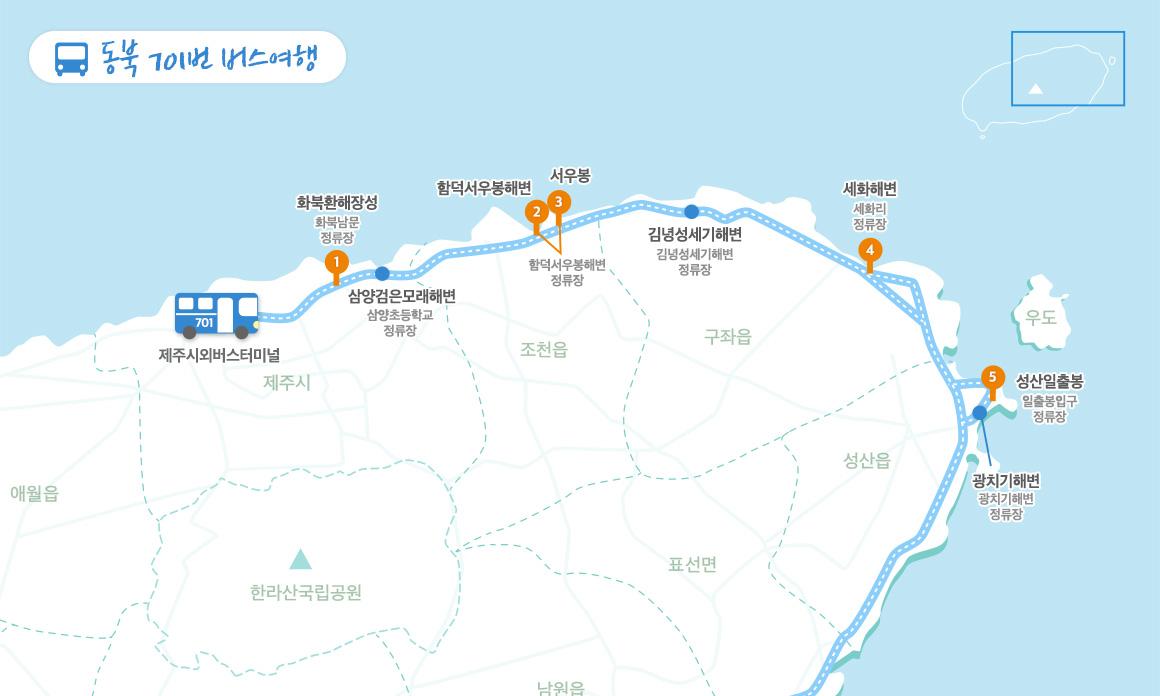
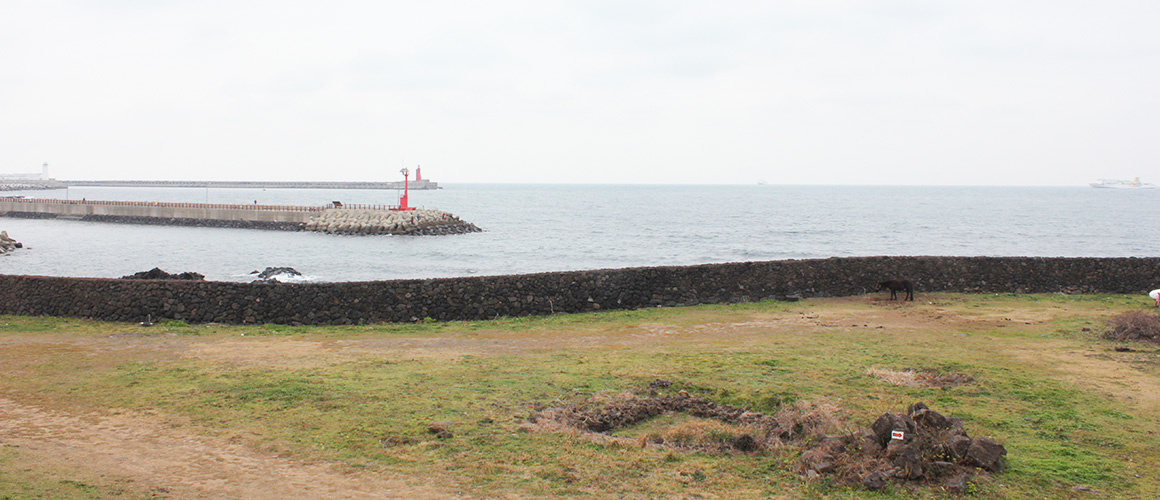
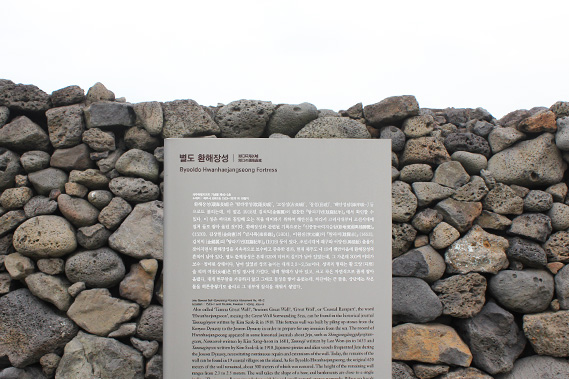 First stop:Hwabuk Hwanhae Great WallFor visitors to Jeju who begin exploring the island for the first time, it’s often the case that Samyang Black Sand Beach is the first coastal destination they set out for. It is very close to Jeju City in addition to being an area with plenty of historical sites. Jeju Olle Walking Trail No. 18 passes along the shore, making it a convenient way to get around on foot.
First stop:Hwabuk Hwanhae Great WallFor visitors to Jeju who begin exploring the island for the first time, it’s often the case that Samyang Black Sand Beach is the first coastal destination they set out for. It is very close to Jeju City in addition to being an area with plenty of historical sites. Jeju Olle Walking Trail No. 18 passes along the shore, making it a convenient way to get around on foot.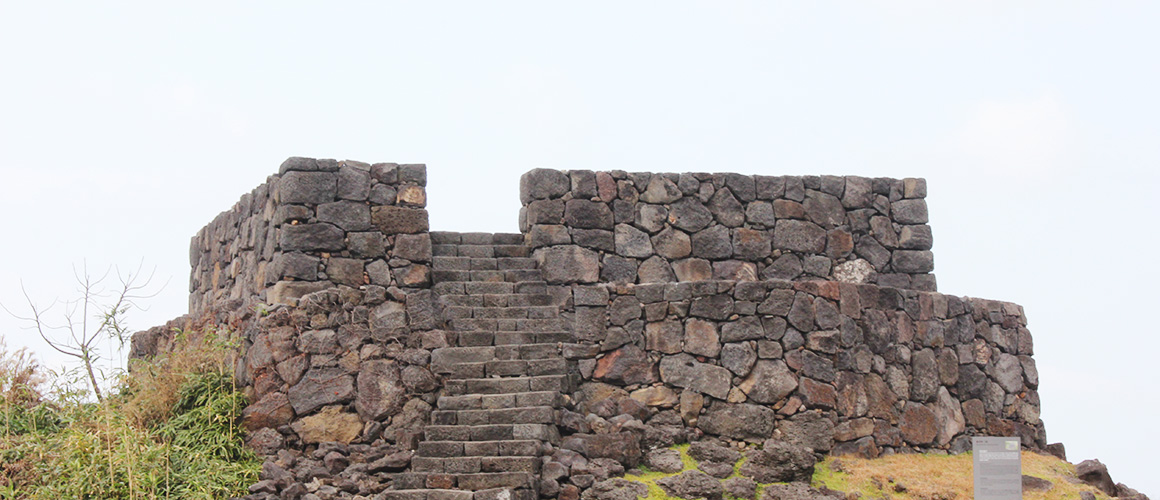 The Hwanhae Great Wall was constructed during the Goryeo Dynasty as a defense against waves of invading Mongolian forces on the Korean peninsula and Jeju Island. There were special units of volunteers and professional fighters in this area of Samyang-dong who from about 1270 were mobilized and manning this wall right through to the Joseon era.
The Hwanhae Great Wall was constructed during the Goryeo Dynasty as a defense against waves of invading Mongolian forces on the Korean peninsula and Jeju Island. There were special units of volunteers and professional fighters in this area of Samyang-dong who from about 1270 were mobilized and manning this wall right through to the Joseon era.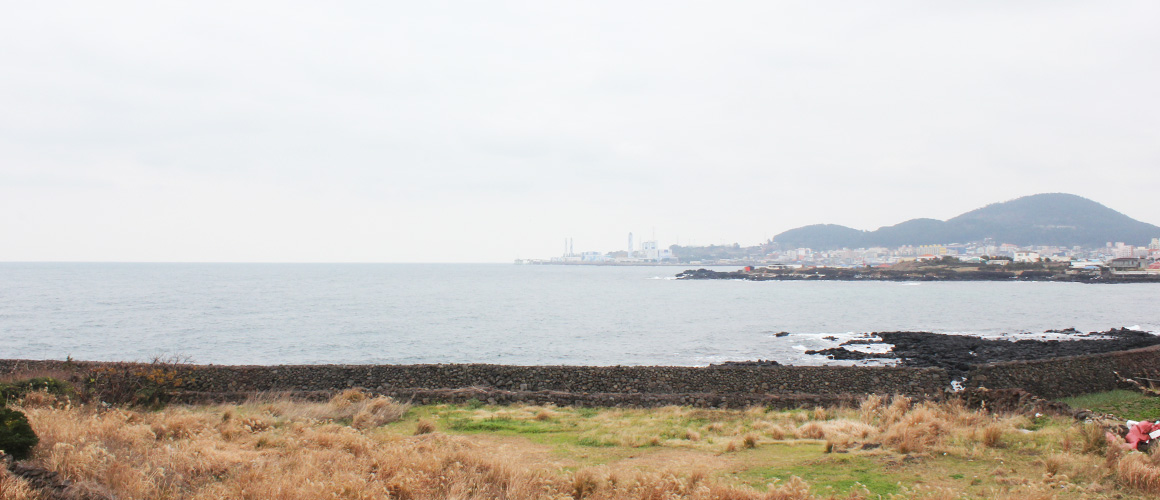 The wall extends some 120 kilometers along the island’s coast, though now it is only intact in certain areas such as Sinsan, Onpyeong, and Aewol. The rest of the wall has either been dismantled or is covered in vines and moss.Hwabuk Hwanhae Great Wall정보 자세히 보기 >
The wall extends some 120 kilometers along the island’s coast, though now it is only intact in certain areas such as Sinsan, Onpyeong, and Aewol. The rest of the wall has either been dismantled or is covered in vines and moss.Hwabuk Hwanhae Great Wall정보 자세히 보기 >
Address 1537 Hwabuk 1-dong, Jeju-si

Bus From Jeju City Intercity Bus Terminal take bus 201 and get off at the Hwabuk Nammun bus stop. Total travel time is about 17 minutes.

Parking Free parking available
 Second stop:Hamdeok BeachThe atmosphere you get at Hamdeok’s beachfront is probably closest to what you’d think of as a classic summer seaside destination. Jeju Olle Walking Trail No. 19 stretches along this part of the coast. The beach itself is known as Hamdeok Seoubong Beach because Seoubong Peak, a small volcanic cone along the shore stops the beachfront from the east.
Second stop:Hamdeok BeachThe atmosphere you get at Hamdeok’s beachfront is probably closest to what you’d think of as a classic summer seaside destination. Jeju Olle Walking Trail No. 19 stretches along this part of the coast. The beach itself is known as Hamdeok Seoubong Beach because Seoubong Peak, a small volcanic cone along the shore stops the beachfront from the east.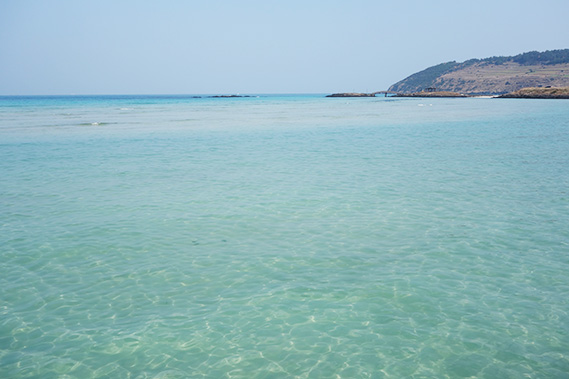
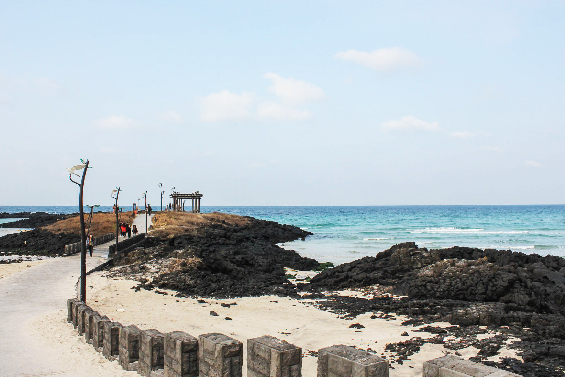 The beach itself is blessed with dazzlingly transparent water. It’s mostly shallow so families can swim together safely. The beach also has lovely large park, restaurants, cafes and facilities for swimmers like large change rooms, showers, and washrooms. There is ample parking and the bus 201 has a stop conveniently located right at the entrance to the beach parking. You can’t see it, but you can smell the ocean as soon as you step off the bus.Hamdeok Seoubong Beach정보 자세히 보기 >
The beach itself is blessed with dazzlingly transparent water. It’s mostly shallow so families can swim together safely. The beach also has lovely large park, restaurants, cafes and facilities for swimmers like large change rooms, showers, and washrooms. There is ample parking and the bus 201 has a stop conveniently located right at the entrance to the beach parking. You can’t see it, but you can smell the ocean as soon as you step off the bus.Hamdeok Seoubong Beach정보 자세히 보기 >
Address 1008 Hamdeok-ri, Jocheon-eup, Jeju-si

Hours Daily 10:00~19:00

Bus From Jeju City Intercity Bus Terminal take bus 201 and get off at the Hamdeok Seoubong Beach bus stop. Total travel time from the city is 38 minutes.

Parking Free parking available
Third stop:SeoubongThis volcanic cone borders Hamdeok Beach to the east. The ridges of this cone-shaped volcanic edifice form two large peaks. A lava boulder is exposed (called ‘Namseomo’) at the top of the southern peak, which is covered in a forest of trees and thickets. The northern peak is a cinder cone made up of scoria, and the top has been taken off, revealing wide grassland and a refreshing view.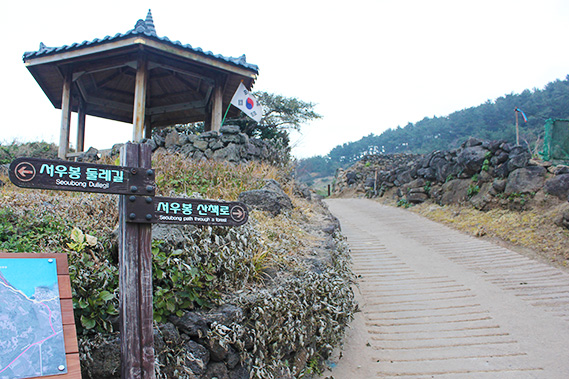
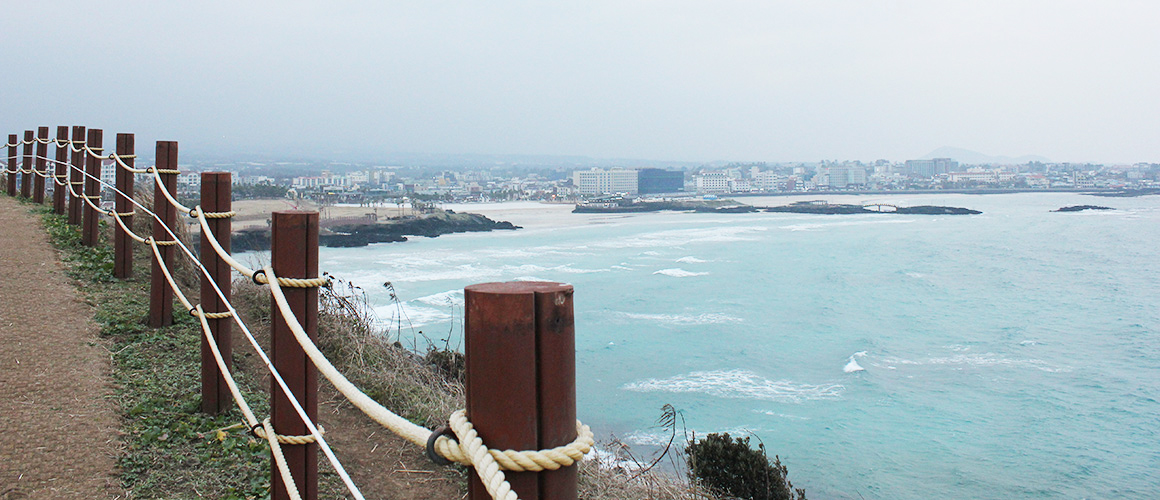 The northern slope is very steep and the foot of the cliff has caves (approximately 20 throughout Bukchon’s Haedong Beach) facing the ocean that were built by Japanese soldiers during the Japanese occupation. At the midway point of the eastern slope is a cave full of water. The summit of the volcanic cone is covered in a forest of pine trees, and all slopes of the volcanic cone have been turned into terraced farmland.
The northern slope is very steep and the foot of the cliff has caves (approximately 20 throughout Bukchon’s Haedong Beach) facing the ocean that were built by Japanese soldiers during the Japanese occupation. At the midway point of the eastern slope is a cave full of water. The summit of the volcanic cone is covered in a forest of pine trees, and all slopes of the volcanic cone have been turned into terraced farmland.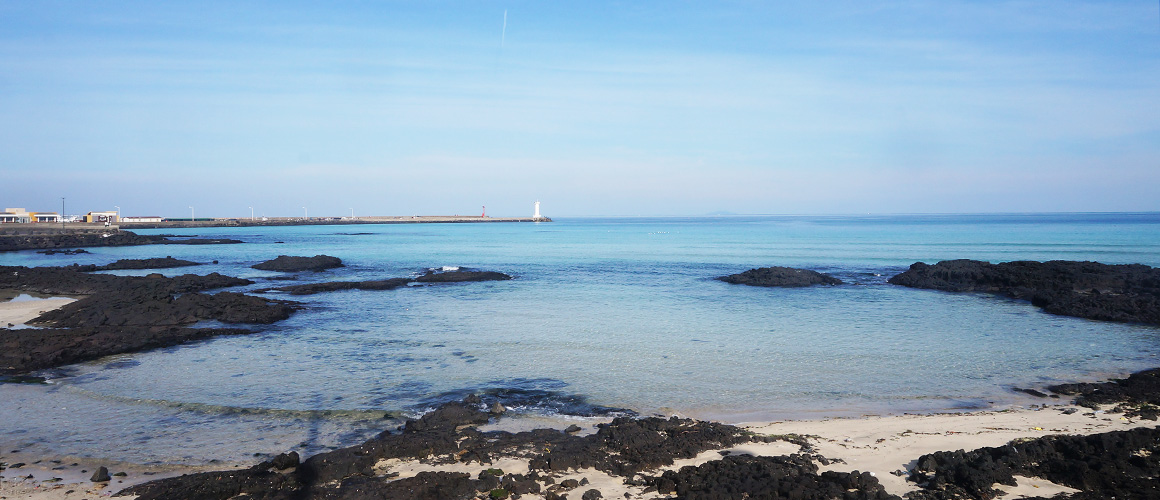
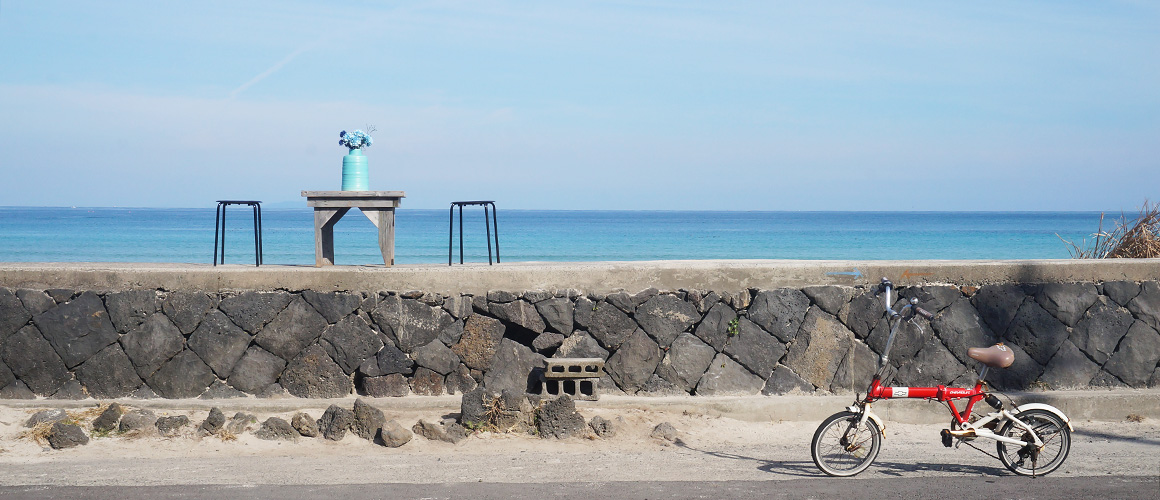 Fourth stop:Sehwa BeachFrom Sehwa Port the first thing you’ll see is a beautiful view of a lighthouse, seawalls, and the blue ocean spread out before you. The wind turbines and the sunset are another sight to see along the Sehwa Coastal Road. There are plenty of great coastal cafes and restaurants for travelers to enjoy. Small shops and cafes sell souvenir candles, postcards and other items for you to remember your visit to Sehwa. That and the beautiful views which you can capture with your phone or camera. It’s a guaranteed great shot every time!
Fourth stop:Sehwa BeachFrom Sehwa Port the first thing you’ll see is a beautiful view of a lighthouse, seawalls, and the blue ocean spread out before you. The wind turbines and the sunset are another sight to see along the Sehwa Coastal Road. There are plenty of great coastal cafes and restaurants for travelers to enjoy. Small shops and cafes sell souvenir candles, postcards and other items for you to remember your visit to Sehwa. That and the beautiful views which you can capture with your phone or camera. It’s a guaranteed great shot every time!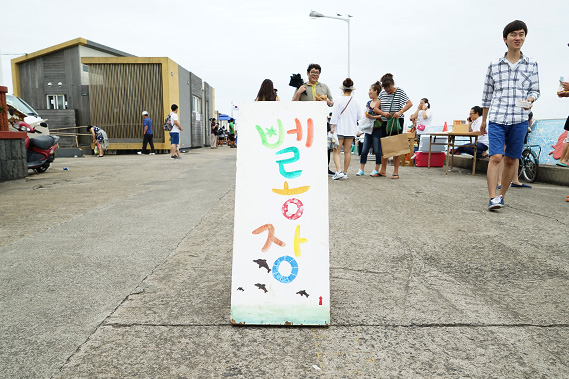


 If you visit Sehwa on a Saturday, make sure to check out their local flea market (or Bellongjang) from 11 a.m. to 2 p.m. There are a wide range of handmade items and handicrafts by locals and artists.Sehwa Beach정보 자세히 보기 >
If you visit Sehwa on a Saturday, make sure to check out their local flea market (or Bellongjang) from 11 a.m. to 2 p.m. There are a wide range of handmade items and handicrafts by locals and artists.Sehwa Beach정보 자세히 보기 >
Address Sehwa-gil, Gujwa-eup, Jeju-si

Hours Daily 10:00~19:00

Bus From Jeju City Intercity Bus Terminal take bus 201 and get off at the Sehwa-ri bus stop. Total travel time is about 1 hour and 23 minutes.

Parking Free parking available
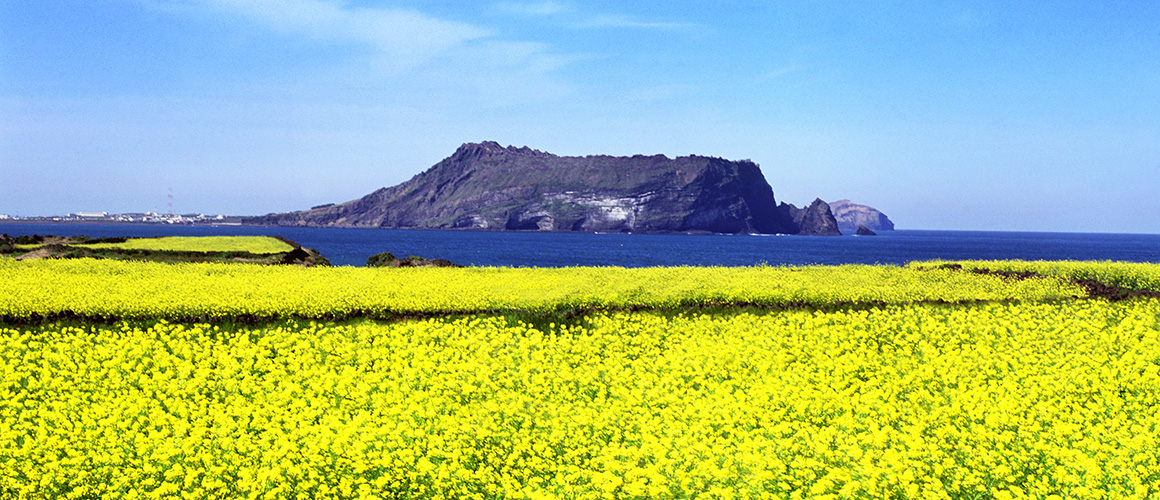 Fifth stop:Seongsan IlchulbongBus trips on Jeju have a lot to offer travelers by way of beautiful sights and relatively short distances. The open ocean and Hallasan Mountain at the center of the island, are for the most part just a glimpse away. But along the 201 bus route at the far east of the island is perhaps the most picturesque destination of them all... Seongsan Ilchulbong, which rises majestically from the sea and is one of the island’s greatest geological and cultural treasures.
Fifth stop:Seongsan IlchulbongBus trips on Jeju have a lot to offer travelers by way of beautiful sights and relatively short distances. The open ocean and Hallasan Mountain at the center of the island, are for the most part just a glimpse away. But along the 201 bus route at the far east of the island is perhaps the most picturesque destination of them all... Seongsan Ilchulbong, which rises majestically from the sea and is one of the island’s greatest geological and cultural treasures.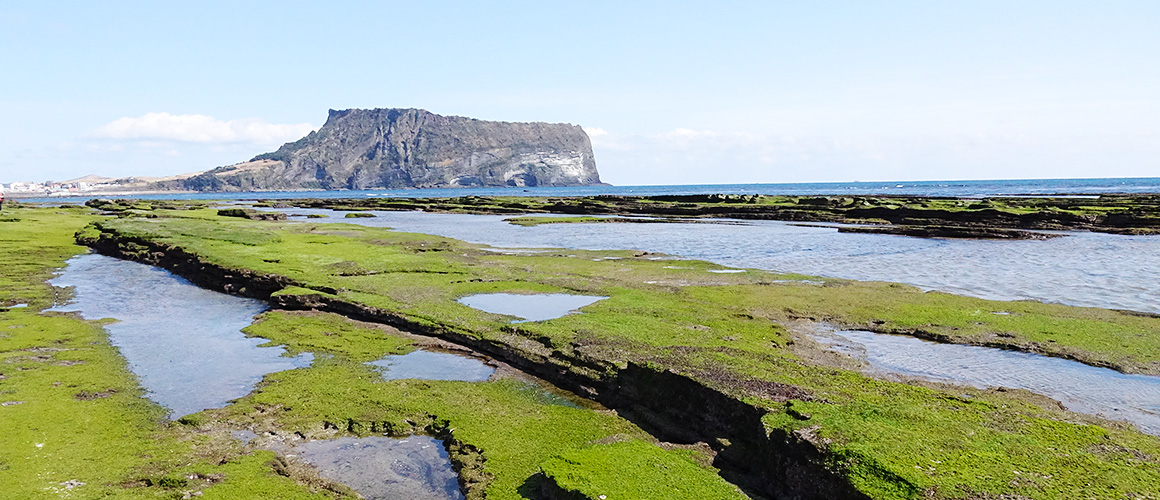 Seongsan Ilchulbong Peak, which is 180-meters above sea level, erupted underwater in the ocean about 5,000 years ago, which makes it a very rare case among the many craters in Jejudo Island.
Seongsan Ilchulbong Peak, which is 180-meters above sea level, erupted underwater in the ocean about 5,000 years ago, which makes it a very rare case among the many craters in Jejudo Island.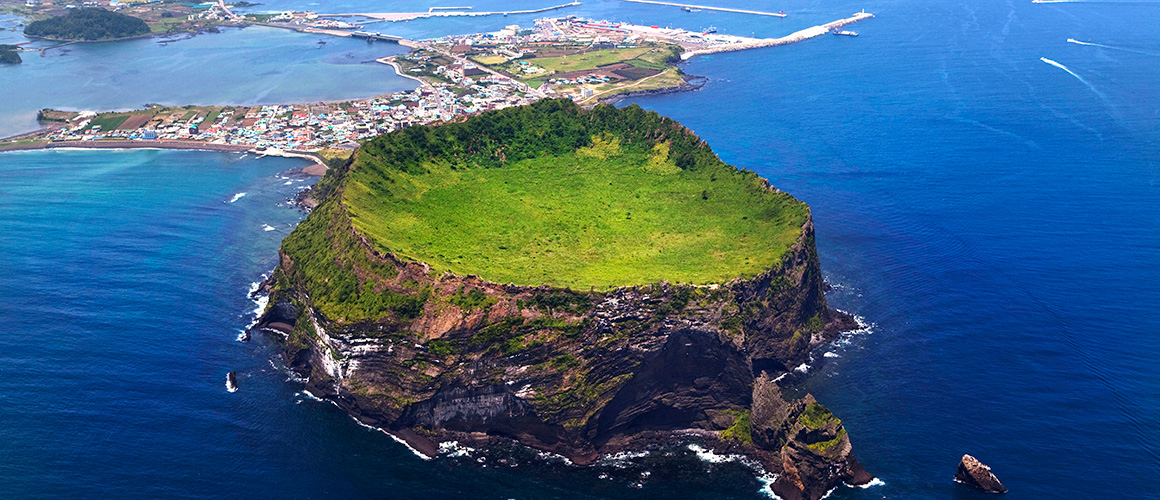 The site is so popular that over the years its tourism infrastructure has been built up and well developed. There is plenty of parking and places for visitors to rest and eat while in the area.The vicinity is also blessed with many lovely beaches and areas to explore along the east coast. For example, there is unique scenery at low tide along Gwangchigi Beach opposite Seongsan Ilchulbong, which since 2007 has been a designated UNESCO World Natural Heritage site.Seongsan Ilchulbong정보 자세히 보기 >
The site is so popular that over the years its tourism infrastructure has been built up and well developed. There is plenty of parking and places for visitors to rest and eat while in the area.The vicinity is also blessed with many lovely beaches and areas to explore along the east coast. For example, there is unique scenery at low tide along Gwangchigi Beach opposite Seongsan Ilchulbong, which since 2007 has been a designated UNESCO World Natural Heritage site.Seongsan Ilchulbong정보 자세히 보기 >
Address 284-12 Ilchul-ro, Seongsan-eup, Seogwipo-si

Hours Daily 10:00~19:00

Fees Adults: 2,000 won, Children: 1,000 won

Bus From Jeju City Intercity Bus Terminal take bus 201 and get off at the Ilchulbong Entrance bus stop. Total travel time from Jeju City is about 1 hour and 44 minutes.

Parking Free parking available

Web http://jejuwnh.jeju.go.kr/contents/index.php?mid=0202
< Related >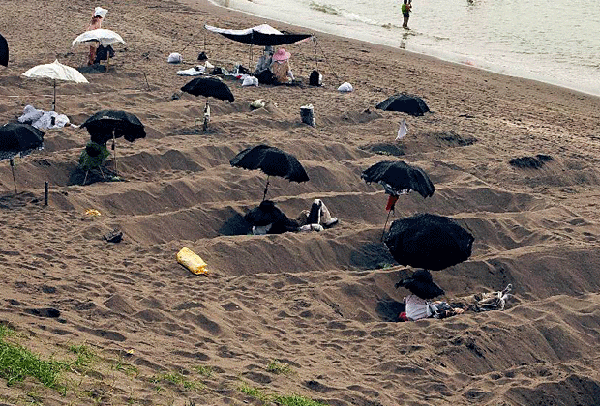 Samyang Black Sand Beach
Samyang Black Sand Beach
Address Samyang 2-dong, Jeju-si

Hours Daily 09:00 ~ 18:00

Bus From Jeju City Intercity Bus Terminal take buses 201 and get off at the Samyang-dong Citizen Center bus stop. Travel time is about 38 minutes and the walk from the bus stop is about 13 minutes.

Parking Free parking available
 Gimnyeong Seongsegi Beach정보 자세히 보기 >
Gimnyeong Seongsegi Beach정보 자세히 보기 >
Address Gimnyeong-ri, Gujwa-eup, Jeju-si

Hours Daily 10:00 ~ 19:00

Bus From Jeju City Intercity Bus Terminal take bus 201 and get off at the Gimnyeong Seongsegi Beach bus stop. Total travel time from the city is about 1 hour and 5 minutes.

Parking Free parking available
 Gwangchigi Beach정보 자세히 보기 >
Gwangchigi Beach정보 자세히 보기 >
Address Ojo-ri, Seongsan-eup, Seogwipo-si

Hours Open daily

Bus From Jeju City Intercity Bus Terminal take bus 201 and get off at the Gwangchigi Beach bus stop. Total travel time is about 1 hour and 16 minutes from Jeju City.

Parking Free parking available
- Notice
- Invalid date
- ※ Unauthorized use of the content above (text, photos and videos) is prohibited and subject to copyright by the Jeju Tourism Organization.